
 |
-
Sometimes, music falls on my desk that I know will never be fully explainable as a review. Such is the strange world of Little Big Noz, the musical offspring of baritone saxophonist Ronan Le Gouriérec and his vocal antagonist Philippe Chasseloup. Together they have created a satirical show based on the traditional dance music of Brittany.
The CD version of these performances is just Gouriérec and Chasseloup, They play word games with the dances and their sometimes rigid interpretations by the participants, and Le Gouriérec turns the music on its head in a solo saxophone attack that respects the melodies, but more importantly, the freedom those melodies offer a creative musician. Because the chatter is all in local French, and is further complicated by the inside jokes and double entendres they insert, Gouriérec offered to help me interpret a few of them for you. Read more and enjoy some of the music.
|
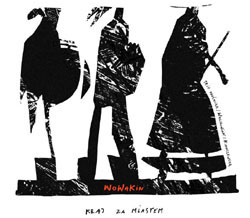
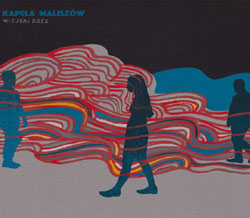
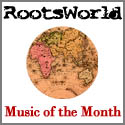
|
-
From Poland's burgeoning folk roots scene come two new and distinct bands. Both are trios, yet each group earmarks their locale.
WoWaKin are from the Mazovia region, an area that includes Warsaw, in the northeast of Poland. Each group creates thick clouds of trance-inducing sound built on traditional rhythms from the Polish countryside. The trio offers an array of foxtrots, tangos, polkas, oberkas, and more on their debut album. WoWaKin are comprised of Paula Kinaszewska (violin, vocals); Mateusz Wachowiak (accordion); and Bartlomiej Wozniak (drums and sound design). Their repertoire borrows from the Polish areas of Kielce, Radom, and Sanniki.
Kapela Maliszów is a family band from a small village in the Lower Beskids mountain range, located in southeast Poland, bearing towards Slovakia. The ensemble is comprised of Jan Malisz and his two children, Zuzanna (age 14) and Kacper (age 18). Jan Malisz anchors the group with his basolia, a Polish instrument reminiscent of the cello. Zuzanna sings and accompanies on percussion and Kacper plays both violin and nyckelharpa.
Read Lee Blackstone's reviews and listen to some tracks from each album.
Michal Shapiro was at WOMEX 2017, held in Katowice, Poland, and filmed each of these excellent ensembles.
|
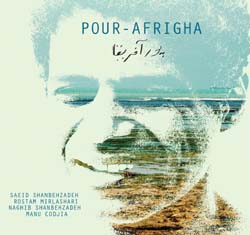 |
-
Politics and music are rarely far apart, as perhaps nowhere more evident than in the music of exiles wherever they find themselves. At a forcible remove from its cultural foundations, dislocated artistry resides as close as memory and sentiment can bring tradition bearers to a time, place and way of life that, if now denied to the artist, can be only more unfamiliar to the audience. Yet all that changes when the artist, in the company of fellow exiles and rootless cosmopolitans, finding themselves in a strange land, commune in song.
Born to a Baluchi father and Afro-Iranian mother descended from Zanzibar exiles enslaved in the Persian Gulf region of southern Iran, Saied Shanbehzadeh himself left for France when his experimental fusions of African-Iranian possession ritual music and other regional folk forms found disfavor with the cultural police (he was convicted in absentia for blasphemy and faces lashing and imprisonment if he were to return). Shanbehzadeh sings, composes, arranges and plays the neyanban (a double-reed bagpipe made of goatskin) and saxophone. On Pour-Afrigha he is joined by Iranian Baluchi singer Rostam Mirlashari, a former political prisoner, and accompanied by French guitarist Manu Codija, Shanbehzadeh's son Naghib on percussion (zarb-timpo, dammam, kesser, darbuka), and several other guests. Read Michael Stone's full review, hear some excerpts and see a video performance.
|
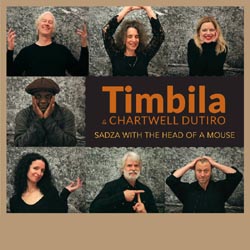
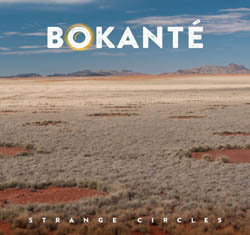
|
-
The sound and spirit of Zimbabwe and Mozambique runs through the heart of Timbila and Chartwell Dutiro's double album collection Sadza with the Head of a Mouse. Timbila is a New York-based band, led by Nora Balaban, that met in Zimbabwe in 1997. Since then they have delved into the rich heritage of southern Africa's songs and instruments, adding their own East Village multicultural explorations to the music. Here they are joined by vocalist and mbira master Chartwell Dutiro, a former member of Thomas Mapfumo and the Blacks Unlimited who now resides in the U.K.
Strange Circles is the debut offering from Bokanté, an ensemble put together by Snarky Puppy's Michael League. The group's name translates from Creole to "exchange" in English and the eight musicians from four continents have developed a cohesive, layered multicultural sound that serves as a foundation for Malika Tirolien's rich vocals sung in Creole and French. While in Canada, League heard the voice of Tirolien, who hails from Guadeloupe and now lives in Toronto. The meeting inspired the creation of Bokanté, with League and Tirolien collaborating on the music and Tirolien handling the lyrics. They are joined by fellow Snarky Puppy guitarists Chris McQueen and Bob Lanzetti, percussionists Jamey Haddad, André Ferrari, and Keita Ogawa, as well as Roosevelt Collier on pedal and lap steel guitars.
Both reviews include full tracks from the albums.
|
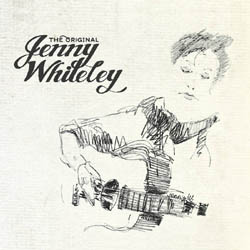 |
-
Greg Harness writes, "Years ago, as a new parent, I was looking for songs that would engage my daughter without the insipidness that comes with much children's music. I learned quickly that Raffi was usually a good bet, and a Raffi record became a sure thing when Ken Whiteley was involved. This was my introduction to the Whiteley family, and led me to learn more about Ken and his brother Chris and their Original Sloth Band. More recently I've been drawn to Chris's own daughter Jenny Whiteley, who I just learned sang in the chorus on Raffi's "Baby Beluga." Her newest recording is The Original Jenny Whiteley. For readers who listen regularly to the roots music of the American south -- Appalachian string bands, bluegrass, jug bands -- many of these songs will be familiar."
Read greg's review and listen to some of the songs/
|
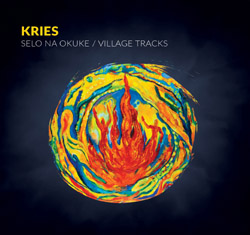
|
-
Kries is a legendary Croatian folk-rock band that has thankfully resurfaced with Selo Na Okuke/Village Tracks, eight years after their previous album . Understanding Kries' message of solidarity and unity is essential to their mission. The band formed after the raging of the Balkan War in the 1990s, and the musicians that comprise Kries are drawn from countries caught up in - or touched by - the conflict that engulfed the Balkan region.
The founder of Kries is Mojmir Novaković. Novaković, like many musicians at the forefront of a modern revival of traditional folk music, sought to infuse the songs of Croatia and the Balkans with a progressive twist. Accompanying Novaković in Kries are folk luminaries such as Andor Vegh (a Balkan music expert) on bagpipes and flute, and multi-instrumentalist Ivo Letunic on lijerica (a three-stringed, bowed instrument), and the Serbian gusle (a one-stringed, bowed instrument). There is a roaring percussive section, comprised of Ivan Levačić on drums, and Krešimir Oreški on percussive instruments including the djembe. The group is fleshed out with Erol Zejnilović on guitar, and Konrad Lovrenčić on bass. As a result, Kries combines traditional folk music instrumentation alongside the elements of a rock band... Read Lee Blackstone's full review online, listen to some full tracks, and watch some marvelous videos.
You can also hear a few tracks of the album in an archived edition of RootsWorld Radio #249.
Kries' Selo Na Okuke / Village Tracks is our selection for Music of the Month in November. It was donated by the artists and Riverboat Records, so all proceeds go to support the magazine and radio program. We thank them for their generous support.
|

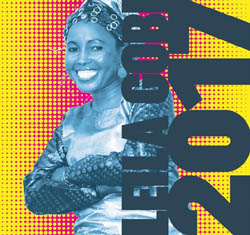
|
-
These two CDs provide different aspects of West African pop music recorded this year. Valérie Ekoumé's Kwin Na Kingue is the slicker of the two. French born, but with roots in Cameroun, she studied music formally for half a decade; youtube clips reveal a woman who can knock out a pop ballad with nothing but her own piano as accompaniment just as easily as she can slide into a Makossa-influenced vamp and bring an audience to its feet.
Leila Gobi's sophomore LP, 2017, is a different story. The recording - her voice, drenched in confident stealth over guitar, bass, and percussion - is complimented by whatever production constraints Hampathe Bah Studio in Bamako, Mali imposed on it. While no one would mistake this for the work of a Tamesheq griot, it manages to stay a bit closer to Malian pop's musical chassis. In fact, despite the stripped-down accompaniment, this record delves a bit further into dance grooves than her first one... Read Bruce Miller's reviews of both of these recordings, listen to some of the music and see a video.
|
 |
-
"I want to work in this world... I'm not going to pretend I'm something I'm not"
Marty Lipp sits down with someone who has his own interesting answers to the question "What Is Americana?." Folk artist, modern composer, blues enthusiast and arranger Dick Connette made his first mark in the American music scene in the 1990s with his project, Last Forever, a duo with Sonya Cohen, abetted by a marvelous group of musicians from many areas of interest. Dick is back this year with his latest dive into American roots music waters with a new project, Too Sad For the Public, this time with a number of singers, Ana Egge, Gabriel Kahane, Suzzy Roche and Rachelle Garniez.
Read the tales Dick had to tell to Marty, and listen to some of the music in his RootsWorld interview.
|
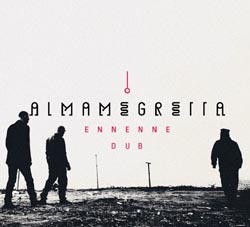 |
-
It's rare when a new disc hits you with such force you just want to absorb it, to savor it, to stay in the moment and just enjoy. Even more so when that disc has a twin, and you discover them both at the same time. In 2016, the veteran Neapolitan group Almamegretta issued Ennenne, followed by Ennenne Dub this year 2017. How to describe a Neapolitan-Jamaican mix of reggae, dub and Mediterranean sounds, a little Nico d'Angelo and a little Lee "Scratch" Perry. There are many Neapolitan artists that mix international sounds and the Neapolitan language, among them 99 Posse, and world music maestro Enzo Avitabile, just to name two. That's a rich vein of music and Almamegretta is at the heart of it… David Cox reviews the recordings, and you can read it all and listen to some tracks from both online now.
|

|
-
Afro-Venezuelan singer Betsayda Machado y Parranda El Clavo was founded 30 years ago in the cacao-growing region where the settlement of El Clavo, located some 40 miles southeast of the capital, Caracas. Inspired by her father, a parranda trumpeter, Betsayda Machado began singing at an early age; her manifest talent eventually took her to Caracas, where she has been primarily based in recent years.
The windward Barlovento region is renowned for its African-Venezuelan parranda ensembles, Parranda El Clavo among them. The power of the genre owes at least as much to the energy of the singing as to the drive of the percussion. Indeed, on the majority of the songs, the chorus sings the opening phrase or verse a cappella to set the tune, with the percussion joining subsequently. It's all to be heard on their first album, Loé Loá: Rural Recordings Under The Mango Tree.
Michael Stone takes an in-depth look at the music and mission of the ensemble and their first recording
|
 |
-
As the US withdraws from UNESCO citing so-called "anti-Israel bias" it seems a good time to reflect on what the United Nations Educational, Scientific, and Cultural Organization has done and continues to do for roots and world music… Beginning in 1961, UNESCO began collecting local music, mostly through field recordings, as a way to showcase and preserve aural traditions… Many musicians including Gilberto Gil, Manu Dibango, and Kudsi Erguner have been named UNESCO Artists for Peace…
Greg Harness shares some thoughts on the importance of UNESCO
|
 |
-
The musical term Americana has been tossed around in the media for ages, using it to denote authenticity for even the most manufactured musical products.
Artists have long sought inspiration in the blues, R&B, spirituals, gospel, old timey, folk, civil rights song, country, rock, pop and the realm of culture, history and politics more broadly, an expansive array of influences. The recordings essayed here suggest that the politics of everyday life have much to do with how what might be called Americana has evolved. Some classic examples from the period in which civil rights, the free speech movement, anti-war activism, an emergent environmental awareness, and allied initiatives seeking a more inclusive definition of citizenship illustrate how music speaks to the social movements of its times.
Explore new works that expand those roots in new directions, with music from Jaimeo Brown Transcendence, René Marie, Ranky Tanky, Indra Rios-Moore, Brian McCarthy Nonet, Sam Bardfeld, Matt Slocum, Omar Sosa and Tim Eriksen.
Michael Stone offers a different perspective from the usual in his piece, What Is Americana?
|
 |
-
Jérémy Courault is the leader and voice of the inimitable trio Djé Baleti. Hailing from Toulouse, France, Baleti incorporate various African and European styles into a whirling array of music. Imagine if Hendrix was raised in Mali and grew up in Italy, and played a long-necked espina instead of an electric guitar. That's close to what Courault -- who grew up just about everywhere -- and his band does on Moko. With Sophia Ramia Medina on bass and Antoine Pedriolle on drums, Djé Baleti reimagines rock by way of highlife, tarantella, chaabi, and numerous other sources. The insistent energy of this record begins with "Manda Lo Batéu" the title track, with its descending espina riff, moments of Doors-like rock, and continues through long and short pieces, 12 in all.
Read what David Cox has to say about this "esoteric and frankly eccentric album," listen to some music and watch a wonderful animated music video.
|
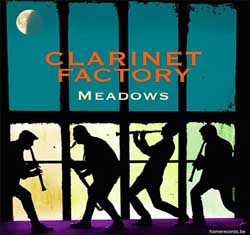 |
-
Clarinet Factory is a band that absolutely defies categorization. My initial impression of their latest CD, Meadows, was that this was going to be a chamber-jazz project that occasionally riffed on folk themes. I could not have been more wrong. Originally calling themselves the Czech Clarinet Quartet, Clarinet Factory's mission remains the crossing of borders. The group features four clarinet players – Jindřich Pavliš, Luděk Boura, and Vojtěch Nýdl, plus Petr Pepíno Valášek on bass clarinet. Nýdl also provides lead vocals on many of the album's songs. All the members of Clarinet Factory have a classical background, and this is more than evident in Meadows' frequent nods to the minimalist genre… On the band's website, Jindřich Pavliš states that Clarinet Factory seeks to work in 'inter-genre' projects. "We want to be an ensemble which has something to say. Not a museum!"
Read Lee Blackstone's full review, listen to some of the music and see their brand new video.
|
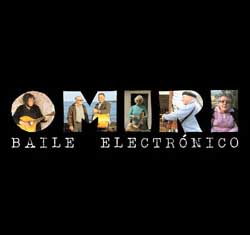 |
-
Vasco Ribeiro Casais is a multi-instrumentalist who plays around with traditional music in interesting and creative ways. In this new OMIRI project, the former member of Dazkarieh and Seiva, has here pasted together traditional recordings, studio effects and dance tunes to hypnotic effect. This 13-song second effort is in effect a solo project for Casais, the prolific and versatile bouzouki, violin, nyckelharpa and gaita player. On Baile Electronica he provides a new setting for corridinhos, chotiças, polcas, and other traditional dances. Mixing old recordings with his instrumentals and studio effects, Casais revisits some fine field recording material, dissecting and splicing, prompting a fresh look at what has been there all along.
Read David Cox's full review and listen to some music and a video online now.
|
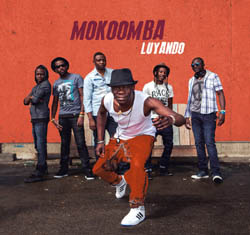 |
-
Mokoomba return with Luyando, an album that reveals a group that continues to grow more dynamic with each release. For this record the band wanted to place more emphasis on the area of Zimbabwe they call home. They refer to their falls as "smoke that thunders" in their language. Luyando translates to "mother's love" in Tonga and this effort proudly displays their Tonga and Luvale heritage.
Alex Brown takes us to Victoria Falls
|
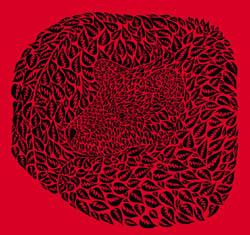 |
-
The latest prog-folk outing of the Occitanian/French collective Artús is titled 'Ors,' named after the great bear of the forests and mountains of the Pyrenees. What the band has fashioned is a thematic song-cycle, equal parts philosophical and spiritual. The essential theme of 'Ors' is humankind's struggle with the brute beast within, and our coming to terms with our species' savage tendencies. Artús delves deep into the rift between nature and civilization.
Read Lee Blackstone's review and listen to the music.
|
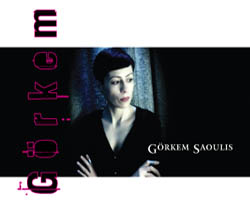
|
-
The self-titled recording by Turkish musician Görkem Saoulis is akin to taking a trip back in time. However, as the author L.P. Hartley famously stated, "The past is a foreign country." Saoulis' skill as a vocalist and a player of kanun (a zither found in the Middle East and Mediterranean countries) is the main attraction. In addition to Turkish songs, the album features Azeri (Azerbaijani) and Greek selections as well. Crucially, Görkem Saoulis and the Greek musician Yannis Saoulis (who has arranged this repertoire) seek to infuse the music with influences from both sides of the Aegean Sea. The album thus feels familiar, in its evocation of the past, but in a contemporary twist the music conveys the desire to make clear the indebtedness of dialogue between countries and peoples. The result is that Görkem sounds as if Turkish music has been combined with the Greek rebetika tradition.
|
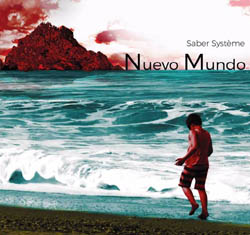 |
-
As folk revivals are begun, maintained, and develop, their musical practitioners become mentors and inspiration for a new generation. The new project of Saber Système carries the torch for Occitan music, and the band is a fascinating outgrowth of the investment that members of the stunning Occitanian group Gai Saber have made in their communities. Gai Saber have formed the Associazione Culturale Gai Saber, which has made cultural outreach efforts in the Piedmont territory of Italy. The Piedmont is close to France, and it also borders Switzerland; the ancient Oc language is spoken in the valleys. The language was used by the medieval troubadours, and today the Associazione is part of the effort to keep the language current in poetry, music, and literature.
One program run by the Associazione Culturale Gai Saber took place in the school system, where one class connected the medieval troubadours to modern poetry. When the course was offered in the northern Piedmont town of Cuneo, a group of young students (around 16 years old) began to work on musical compositions under the tutelage of Gai Saber. These experiments led to a group, Saber Système ('Knowledge System'), which has its own distinct identity on its first release, Nuevo Mundo.
Listen to the music and read Lee Blackstone's review
|
 |
-
It is my impression that Portuguese folk music stands apart from the mainstream of Southern European and Iberian musics. While much of the region is linked by proximity to the Mediterannean, Portugal looks out into the Atlantic, and like Britain has developed links overseas rather than to the continent.
Portugal, like Galicia, has encouraged and nurtured many strong female vocalists. Two recent recordings from Portugal showcase the bright and tuneful melodies of Celina da Piedade, the singer from Alentejo, south of Lisbon, and versatile Sara Vidal of Diabo a Sete. Both discs come out of the Sons Vadios cultural cooperative, a leading Portuguese folk producer and distributor…." David Cox shares two very different recordings from Portugal that both find interesting new takes on the tradition.
|
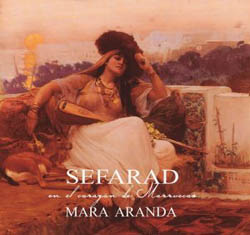 |
-
In the hands of skilled interpreters, Sephardic music has a way of transporting not the listener to the past but the past to the listener. Mara Aranda is one such interpreter. Sefarad en el corazón de Marruecos is her latest excursion into romances of the Sephardim, and finds the Valencia-born singer deepening her love of this repertoire, focusing on the Jewish diaspora in northern Africa by way of Spain. Understanding the complex history of these itinerant exchanges and motivic blending is reason enough to own a physical copy of this album, the booklet of which contains an extensive essay by medieval historian José Hinojosa Montalvo, and informative writings by others… Suffice it to say that the mythos of Sephardic song, drawing from multiple sources as it did, is alive and well in the artful arrangements of Aranda and her ensemble. Fans of Greek singer Savina Yannatou will have no trouble in connecting the dots here, as songs of matrimony, determined women, and mortality reveal as many color combinations as there are words to describe them.
Read Tyran Grillo's full review, listen to a full track and some extracts, and see a video performance.
|
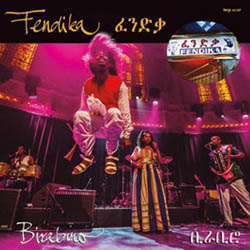
|
-
If you've always hankered to while away an afternoon drinking tej and listening to Azmari music in a real live Ethiopian tej bet, but couldn't afford that flight to Addis Ababa, then have I got the band for you. Fendika is a musical collective based in Addis dedicated to exploring the Azmari repertoire - an acoustic tradition usually centered on a vocalist accompanied by the krar lute or the one-stringed masenko fiddle, and various percussion. They are back with their fourth full-length album, Birabiro, and a deep dive into Azmari tradition…
Read Tom Pryor's review, listen to the music, and see a video of a live performance.
Birabiro was our Music of the Month selection for August. Subscribe monthly, or buy just this CD and support RootsWorld while you get some great music..
|
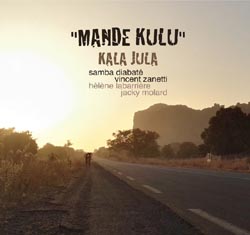 |
-
There is something about the kinship between West African and European string traditions, and the blend of kora, Mande lute (jeli n'goni), guitar, cello, string bass and piano has produced some enthralling results. Ali Farka Toure and Ry Cooder's Talking Timbuktu comes quickly to mind, which in turn informed the "Mali to Memphis" trope framing the transatlantic… Mande Kulu is the third release of the Malian-Swiss combo Kala Jula, teaming Bamako griot Samba Diabaté (guitar, jeli n'goni or Mande lute) and Vincent Zanetti (djembé, guitar, zena lute), backed by Jacky Molard (violin, alto, post-production) and Hélène Labarrière (contrabass). Diabaté and Zanetti have a hand in all the compositions, laid down in a Brittany studio… Deeply rooted in Manding tradition yet entirely contemporary, the work flows effortlessly from start to finish…
Read Michael Stone's full review and hear some of the music.
|
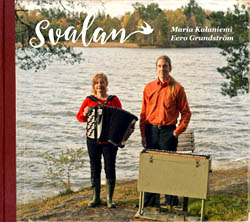 |
-
The title of Svalan (Swedish for "swallow") accurately describes this album's mood before a single note of it graces your ears. As the creation of Maria Kalaniemi (accordion and vocals) and Eero Grundström (harmonium), it thrums with songs of the Northern Karelian forests that inspired it. Recorded in Kalaniemi's childhood home, its program is a mélange of Finnish-Swedish ballads, songs of the sea, and original compositions.
The traditional tunes evoke nature and life within it. "Kom alla mina bröder" (Come all my brothers) is an ideal place to start. With an inspiring sense of community, it invites listeners on a journey far away from the bane of current political unrest. Whether through bellows or throat, Kalaniemi's exhalations are ecstatic, while Pekko Käppi (who also plays bowed lyre on the album) calls out like the voice of the wilderness. Even in the tenderer "Där sitter en fågel" (A bird is sitting there), echoes of that verve linger... Read Tyran Grillo's review and listen to some of the music online.
|
 |
-
Fifteen years ago, three stars of Brazilian music came together in what seemed like a lark, a one-time knock-off project, but the album surprisingly spawned several hits around the world. Calling themselves Tribalistas, the three - singer Marisa Monte, percussionist Carlinhos Brown and art-rocker Arnaldo Antunes - were old friends, and their easy-going camaraderie imbued every song with a loose-limbed, affable charm. While the album came out of the blue, in retrospect it should have been no surprise that the trio would do so well. After all, the three were abundantly talented and creative in their own ways. In fact, one of the interesting features of the project was the creative push and pull of their three distinct personalities and voices.
This sophomore album, 15 years after their first, has arrived with little of the fanfare that one would assume from such a notable crew. The album is a digital release and there is no promotional tour. Whether this was something they spontaneously decided to do amid busy schedules, the result is still a thoroughly enjoyable balmy ride... Read Marty Lipp's full review and hear some of their music.
|
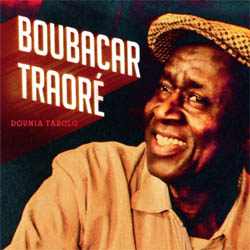
|
-
In the late 1980s, a then older gentleman with a guitar started to make a splash in the global African music scene. In 1990, the London based Stern's Music released an album, the first time most of the world had heard Boubacar Traoré. At the time, I wrote, "Mariama is a solo affair, just voice and guitar, recorded so raw you could hear his fingers on the strings and his breath between vocal lines. It was my introduction to him and I was spellbound."
All these years and 10 albums later, little has changed. Dounia Tabolo, continues his trio effort of a few years ago, with French harmonica player Vincent Bucher and Malian percussionist Alassane Samaké wrapping Traoré's voice and guitar. Recorded in Lafayette, Louisiana, the trio is joined by Cedric Watson on violin and washboard, Leyla McCalla on cello and voice, and Corey Harris on guitar.
Read the editor's review, listen to a full track and some excerpts, and watch a video online now.
|

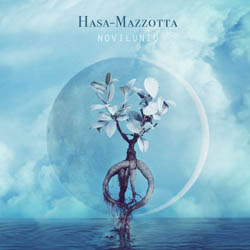
|
-
You have to imagine Puglia, the part of southern Italy that juts into the Mediterranean Sea… The south of Italy has a long history of joy and sadness; riven with poverty, many inhabitants have moved away. As with much of Italy, the influence of the Catholic Church is felt here, hot under the sun; but, there is a persistent pulse of heathenism and rhythm that runs underfoot. Puglia is the land of the taranta, the spider, which bit women (and some men) for thousands of years, causing distressed families to buy the service of musicians so that the afflicted could dance their poisoning away. The Church conflated the spider with Saint Paul, entwining in folk song a sacred/secular eroticism that feels like magic.
Amongst the musicians at the forefront of the first 1970s revivalist wave was the Canzoniere Grecanico Salentino (CGS). Co-founder Daniele Durante passed on the group's leadership to his son, Mauro Durante, in 2007, and Canzoniere is the fourth album made under his tenure.
The Albanian cellist Redi Hasa and the Puglian vocalist Maria Mazzotta comprise the project Hasa-Mazzotta. The two musicians seek to explore connections between their musical traditions, and do so in experimental ways. Novilunio is intimate, bridging folk, jazz, and even cabaret in a bewitching program.
Read Lee Blackstone's in-depth article about pizzica tarantata and how these artists are rooted in place, searching in other places for new sounds and new connections, yet always circling back home. We also have full tracks from each album and some audio excerpts of others.
|
 |
-
Audio Feature
I am pleased to present a live set by the Nordic ensemble, Floating Sofa Quartet, recorded in Denmark at the Tønder Festival in August as part of the FolkSpot 2017 concert series. Their repertoire is a mixture of original compositions and traditional pieces from their respective countries (Denmark, Sweden and Finland), performed with great harmonies, intensity, humor and the warm sound of wooden instruments - wooden flute, Swedish bagpipes, 2 and 5-row melodeons, harmonium, fiddle and double bass.
You can hear the concert online.
|
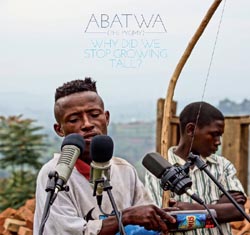 |
-
As Ian Brennan continues to reveal music made by the world's more endangered or marginalized people, he travels deep into the hills of Rwanda to record the music of Twa pygmies, who can also be found in Southern Uganda, Northern Zambia, and scattered about the DR Congo. Frustratingly, this ethnic minority group is as voiceless as it gets in Africa, though none of that comes across in the music found here. Featuring such traditional instruments as the umuduri and the massive board zither known as the inanga, which, as played by the Twa, coaxes the vocals out as mourning-filled moans, as the inanga's plucked strings provide pulse as well as occasional heavy riffs. Here and there, short bursts of electronic noise replace the typical instrumentation for jittery warnings about AIDs; sounds like sirens or cicadas plugged into amps briefly appear to form whole, yet fleeting tracks.
Read Bruce Miller's review, hear some of the music and watch a video recorded in Rwanda.
|
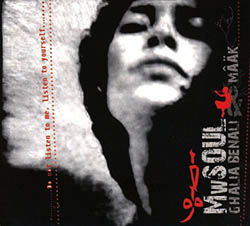

|
-
The Art of Allegory
Michael Stone brings us the music of Brussels based Tunisian singer Ghalia Benali, in collaboration with her musicians and the Belgian brass ensemble Mâäk. Together they find lyrical inspiration in classical and contemporary love poetry of the Arabic- and Persian-speaking world on the album MwSOUL.
Ghalia Benali appears again on one of the two recordings presented next, both the work of an innovative group of artists. Zefiro Torna is no stranger to treating the old as new, and vice versa. In addition to combining a love of medieval and Renaissance music with jazz and other modern modes of expression, the Flemish vocal-instrumental ensemble has worked extensively with performers, stage directors, and individual artists to widen the scope of their repertoire while also hinting at universal impulses within it.
Two recent CDs highlight the adventurous spirit behind such collaborations. Scattered Rhymes is created with the Frank Vaganée Trio. The Allegory of Desire finds them in centuries-spanning musical settings of the Biblical "Song of Songs" in conversation with traditional and original Arabic songs interpreted by Ghalia Benali and the Vocalconsort Berlin.
Tyran Grillo explores the allegorical connections between these two worlds.
|
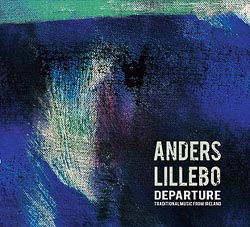 |
-
Musical cross-pollination is complex. Musicians may suddenly be turned on to sounds that divert their music down new paths. For Norwegian piano accordionist Anders Lillebo, the exposure to Irish music at a folk festival in Ireland spawned an obsession. Lillebo had been studying in the hopes of becoming a jazz pianist; the leap to the Irish piano accordion seemed fateful. By moving to Ireland, Lillebo was able to immerse himself in the Irish music scene. On his Departure, Lillebo is joined by Caoimhín O Fearghail (guitar); Tommy Hayes (percussion); Matthew Berrill (clarinet and bass clarinet); and Jack Talty (piano), a master concertina player who also served production duties on the recording. Esbjörn Hazelius guests on fiddle and cittern. All the tunes are traditional except for 'Liam & Diana's Waltz,' and 'Vråka,'the latter named for a place on the western coast of Sweden.
Lee Blackstone reviews.
|
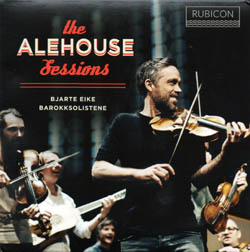 |
-
The Alehouse Sessions is a piece of history unearthed and mantled for new ears. Indeed, Norwegian violinist Bjarte Eike's fascinating project doesn't so much transport us back to the past as reposition the past in the here and now, when its lessons are more poignant than ever. Backed by his Alehouse Boys, a merry band culled from the Barokksolistene ensemble Eike leads, the project's latest CD is a sonic re-creation of 17th-century English taverns.
Tyran Grillo was there live, and shares the music and grog with you.
|
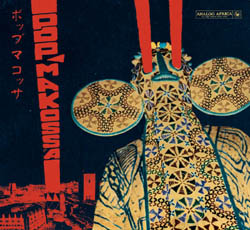 |
-
Bruce Miller takes us back a few decades to hear Pop Makossa: The Invasive Dance Beat of Cameroon 1976-1984. He writes that this album will bring attention back to a number of lesser known but important figures who first helped put Makossa on the map. The term itself translates from the Cameroonian Ko to "fall" and "dance," and an immersion in the sounds collected here show just why this term stuck. Makossa is often a slick, disco-related dance form that is no less substantial for those traits. It may suffer from period production here and there, but this collection presents it as relentless club music. Nobody sat still to this stuff.
Read the full review and listen to some tracks.
|
 |
-
The London-based Teyr take their name from the Cornish language for 'three.' The band -- James Gavin (guitar, violin), Dominic Henderson (uilleann pipes, whistles), and Tommie Black-Roff (accordion) have been seasoned through extensive session playing. Teyr make no bones about their influences, which include the Basque traditions, as well as those from Cornwall, England, Ireland, and Scotland. No doubt there are more tributaries flowing in and out amongst the trio, whose symbol is that of a flying (sycamore) seed, represented beautifully on the cover of the CD by Cornwall artist Billy Wynter. Indeed, there is an artistic bent to Teyr's sound, and a solid, earthy, straightforward-getting-the-business-done that elevates the trio's intricate arrangements throughout their self-released album Far From The Tree.
Read Lee Blackstone's review and listen to some of their music.
|
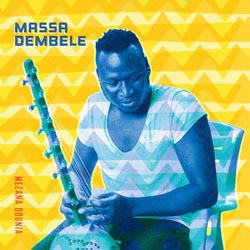 |
-
The emergence of the kamale n'goni in the 1960s allowed Malians who weren't involved in hunter's ceremonies, where musicians played the more rigid, deeper-toned donson n'goni, a larger degree of freedom. The late Vieux Kante is one such master of the smaller harp. But just to Mali's east, in Western Burkina Faso, that same mid-twentieth century invention- an instrument that, despite being termed an n'goni, resembles the kora- had a similar effect on Jelis, Burkina's griot caste. Massa Dembele makes his debut as another kamala n'goni innovator with the release of Mezana Dounia. Dembele has written every track on this LP, which was recorded in a makeshift Ougadougou studio. On tunes unhurriedly plucked, Dembele sends cascades of notes pouring from his harp as he pontificates on notions of the modern world overtaking the traditional…Read Bruce Miller's review, listen to some of the music and see a short film.
|
 |
-
There is little awareness in the West of the presence of important Christian communities in the Arab world. If today there is a bit more, this is due to the very embattled position of Christian minorities in Iraq, Syria and, to a lesser degree, Egypt. The horrific violence of the present has given added momentum the notion that Muslims harbor an inherent hostility to Christians, and that what we witness today is simply the latest in a series of acts of hostility and violence of Muslims against Christians that goes back centuries. This story, of course, does not square with the fact that Christianity has persisted in the region of its birth, and that Christians have thrived and co-existed with Muslims here since the rise of Islam in the 7th century.
Erik Hillestad of the Norwegian record label KKV, in an attempt to highlight the diversity of religious faiths in the Arab world, traveled to Lebanon and made a series of recordings of Christian and Muslim vocalists, including Syrian and Iraqi refugees now living in Lebanon, as well as Lebanese nationals. The singers represent a broad range of religious traditions, all with deep roots in this region, known in Arabic as Bilad al-Sham (in English, the Levant, encompassing Palestine, Syria, Lebanon, Iraq and Jordan)...Read Ted Swedenburg's full review of Syrian Prayers: Sacred Music from Bilad Al Sham, listen to some examples from the recording and see a short documentary by Erik Hillestad about the project.
|
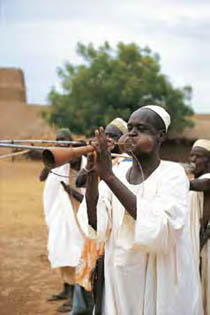 |
-
Over the past 14 years, it's been fascinating to trace Sublime Frequencies' growth. This was a label that cranked up just prior to YouTube and blog downloads of entire albums, the latter of which, let's face it, played some role in killing CD sales. And it was the CD format, housed in shitty jewel cases and crammed with photos and almost no information, in which this label initially trucked… The label has become less allergic to liner note background, and with the release of The Photographs of Charles Duvelle, has embraced and celebrated the extensive musicological wonders of this photographer, who turns 80 this year. This is likely the most majestic entry in the label's now-exhaustive catalogue, a 296-page book devoted to many of Duvelle's photos from the five regions covered here: West and Central Africa, The South Pacific, South East Asia, and the Indian Ocean, plus track-by-track information detailing the music on the two accompanying CDs… Bruce Miller shares his thoughts on the images, the music, and the evolution of a small record label.
|
 |
-
Kullakarva - Shimmer Gold is album number two from the Estonian trio Trad.Attack! It finds them in fine form; confident, assured, and playing to their gift for performing great tunes. As before, Estonian bagpiper Sandra Vabarna blows up a storm (she is also featured on whistles, Jew's harp, and vocals); Jalmar Vabarna (12-string guitar, vocals) provides driving rhythms and sensitive accompaniment; and Tõnu Tubli (drums, vocals, glockenspiel, and zither) is loose and funky… The band's formula seems established: the group roots out traditional tunes, and many of the tracks incorporate a field recording. I enjoy this approach; many 'revival' bands obviously draw on older source materials, but literally embedding the singing of an elder folksinger into one's music provides an interesting connection to the past. Trad.Attack! are clearly in thrall to Estonia's folk music. Songs are based on folk melodies; the melodic line is lifted, or otherwise reconstructed and fleshed out to meet the band's aesthetic…
Read Lee Blackstone's review, listen to a full song and some excerpts, and see a live acoustic performance.
|
 |
-
David Cox veers us off in a completely different direction to celebrate the return of the Cagliari, Sardinia-based roots-rap-reggae outfit, Dr. Drer & CRC Posse. Led by Michele Atzori (Dr. Drer) the band has been active at least since 1991; they've collaborated with members of Massilia Sound System and Assalti Frontali (two of their best-known counterparts in Marseille and Rome respectively) and have released five previous discs. Atzori as main vocalist is again backed up by the strong vocals of Giorgia Loi, rappers Mauro Mou and Giuanni Siccardi on Cabudanni. This is a mature recording of a veteran band that knows what direction it is going. In this case it has added electronica to its rich blend of rap, reggae and traditional Sardinian sounds. The eleven tracks are rich and varied and are sung primarily in Sardinian...Read David's full review and listen to a few tracks.
|
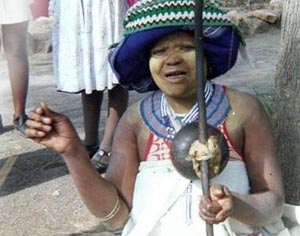 |
-
The Bow Project is no so much a bridge between worlds as a path through them. Its lifeblood is the legacy of Nofinishi Dywili, whose Xhosa musical bow playing is reimagined through the modern lenses. This South African style of bow playing typically serves as accompaniment to sacred and secular songs - and sometimes both, as in the so-called "beer songs," in which performers and listeners alike commune with ancestors over communal drink. The composers featured on this two-disc set were asked to redraw the borders of music originally intended for solo performers.... Fans of the Kronos Quartet's Pieces of Africa wanting something in a similar vein will have cause to rejoice in Michael Blake's "String Quartet No. 3 (Nofinishi)." Dedicated to composer Kevin Volans and based on Nofinishi's personal favorite, "Inxembula," it's an organic introduction to a kaleidoscopic effect of traditions. Yet where the Kronos program feels polished and concert-ready, in the hands of Denmark's Nightingale String Quartet the listener finds an earthier sound... Tyran Grillo takes you on a journey from rural South African to modern classical haunts.
|
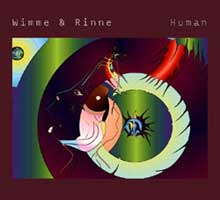

|
-
Wimme Saari is known as one of the world's foremost joikers, the form of musical expression found amongst the Sami people. Tapani Rinne has been the leader of RinneRadio, Finland's electro-jazz experimentalists who have often placed their musical expressions alongside those of folk music. Together, Saari and Rinne have released several albums of essential contemporary joik music. Wimme Saari joiks about nature and its elements; animals; places; and concepts. Saari's vocalizations have been captured solo, and he has also produced by Tapani Rinne, who has set the joiks into deep ambient textures and thudding techno-tribal workouts. Whenever these two musicians join together, there is mystery and joy to be explored... Human, their latest collaboration is a spare, uncluttered release... a work of calm beauty, affirmation, and a holistic worldview, from the top of the world. Listen to some tracks and read Lee Blackstone's full review.
|
 |
-
Alternately driving and lilting, the maloya music of the Indian Ocean island of Reunion is likewise deeply traditional while reserving the right to be thoroughly contemporary where topical matters are concerned. Danyèl Waro has been maloya's leading musical ambassador for decades . He came up hardscrabble, tending fields from early childhood, living without much in the way of simple pleasures and feeling the wrath of the authorities because of offenses that included refusing military service. Waro took naturally to maloya's configuration of percussion and vocals only… Homegrown instruments and influences from mainland Africa, Madagascar and India give the percussion its foundation. The voices, led by Waro's often startling wail and shadowed by ghostly response passages, sing of poverty, spiritual syncretism and such blessings as a good mother.
Listen to some tracks and read Tom Orr's full review of Monmon.
|
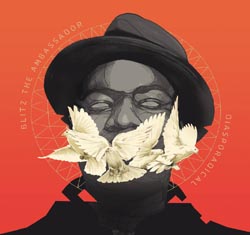 |
-
Brooklyn-based, Ghanaian-born Blitz the Ambassador, aka Samuel Bazawule, takes listeners to school with his particular brand of pan-African hip hop, simultaneously directing attention to key political moments and injustices, and throwing a contagious sonic dance party. His latest release, Diasporadical, is a work of prolific collaboration with artists from several metropolitan areas of the African diaspora: Blitz has sought out the younger generation of jazz musicians in New York (Igmar Thomas, Asante Amin, Christian Mendoza), producers (Optiks), and MCs hailing from his native country (M.anifest), South Africa (Tumi), Germany (Patrice), Brazil (Kamau), and even New Haven, Connecticut (Akua Naru). The unique perspectives of each performer at once shine through and contribute to the complex whole, a singular vision of Black energy and excellence.
Read Dylan McDonnell's full review, listen to some tracks, and see the short film, "Diasporadical Trilogía."
|
 |
-
It is not often one gets to hear samples and syntheses of musics of those residing immediately below the North Pole, especially at many different longitudes. Yggdrasil (named for the Norse tree of life) allows us that opportunity, drawing on the soundscapes and mythologies of the "circum-Arctic" region, specifically the Faroe Islands, Siberia, northwestern Canada, and the Aleutian Islands. The cinematic compositions and arrangements of Faroese multi-instrumentalist Kristian Blak and Russian singer Vera Kondrateva temper the older traditional materials with clarity and sublime sensitivity on Lipet Ei (Seven Brothers). Kondrateva sings primarily in Khanty, a language spoken mostly in western Siberia, surrounded by up to five other musicians at once, spanning string, wind, and percussion textures indigenous to these Arctic communities. Staying true to the liner notes, Yggdrasil remains "in a state of cosmic equilibrium, constantly threatened and devoured as it grows and flourishes."
Dylan McDonnell will explain it all in his review of Yggdrasil's latest recording. Listen to some of the music and see a live performance.
|
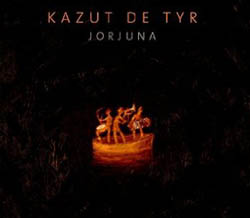 |
-
Kazut De Tyr's second album, Jojuna, takes Breton music on a journey through Central Europe and into the Middle East. The core trio of Kazut De Tyr is comprised of Gaby Kerdoncuff (trumpet, bombardes), Jean Le Floc'h (accordion), and Yves-Marie Berthou (percussion). On Jorjuna, they are joined by Maëlle Vallet (qânûn, a stringed instrument similar to the zither), Kani Kamar (voice; from Kurdistan), Éric Menneteau (Breton singing), and Lionel Mauguen (saz). The resulting mix is fascinating, and the group offers a deep revision to Fest Noz that reimagines Breton dance music with both global sounds and art-music influences.
Lee Blackstone finds the effects of the fusion between Breton music and the Middle East are often subtle, and exciting.
|
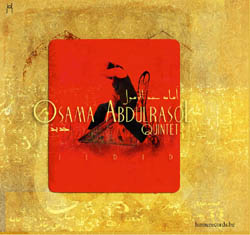 |
-
Jedid, the title of the latest project by Iraqi musician Osama Abdulrasol and his quintet, might refer to an Arabic/Urdu word meaning "modern" or "new," an apt label for a body of composition that seeks to bridge languages and musical styles with common themes in fairly refreshing ways. Abdulrasol, a master of the 'ud and the qanun (Arabic lap harp), extemporizes on romantic and spiritual love: the vocals, by Dutch singer Helena Schoeters, draw on the work of famous poets and original lyrics. The others in the quintet (Philippe Thuriot, accordion; Lode Vercampt, cello; François Taillefer, percussion) alternately support and embrace the melodies of each track. A key point of interest for this project is that the lineup is international (French/Belgian/Iraqi/Dutch) and the languages of the lyrics reflect that, yet there is almost no Arabic sung on the album despite the project's frame. However, the linguistic and purely musical elements commingle effectively due to common expressive goals.
Join Dylan McDonnell in exploring the boundaries and crossing the borders.
|
 |
- The plan was to hold a music festival on the three nights leading up to the September 25th, 1974 world heavyweight boxing championship bout between George Foreman and Muhammad Ali in Kinshasa, Zaire, presenting some of the biggest American stars along with some of the biggest African stars in the same stadium as the fight just when reporters, photographers, celebrities and jet-setters from around the world were converging there for the ballyhooed Rumble in the Jungle. It didn't quite work out that way. Foreman was injured in a training spar, necessitating a five-week postponement of the main event, but it was too late to reschedule the festival. So the show went on, but without the desired international audience and news coverage... Zaire 74 The African Artists is the first proper CD release of some of the music heard in those three days, by artists including Miriam Makeba, Abeti Masikini, Orchestre Stukas, Tabu Ley Rochereau and Franco. The two CD set, packaged in a hardcover book, has its hits and its misses... Ken Braun takes us back to the festival in his review.
|
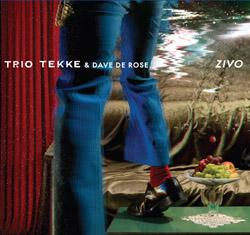 |
-
Zivo is Trio Tekke's third outing, The original trio are joined by a drummer to create what they call "Reggetika": rooted in rebetiko, the urban Greek music that has been the voice of the people and of the underclass and outlaws, and often liked to a Byzantine blues. Trio Tekke uses rebetiko as a foundation, onto which other musical influences are added – American jazz, Latin music, reggae, and psychedelia all find themselves blended into the trio's original sound.
Listen to some songs and samples from the recording and read Lee Blackstone's full review.
|
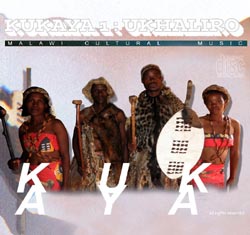 |
-
Bruce Miller introduces you to some more music from the road less traveled. Contemporary, but raw and gutsy, both Kukaya and The Tonga Boys are crucial additions to the conversation about the current state of music in Malawi. Kukaya features multi-generations of drummers and singers performing, among other items, the vimbuza, a healing dance ritual from the Tumbuka-Ngoni tribe of Northern Malawi. The Tonga Boys have added homemade instruments such as plastic buckets, ax, gravel-filled cans and wire-strung guitars to their one drum for music intensely raw, but incredibly precise. Lyrically, they mix tradition with rap-like cadences for a kind of urban DIY that shows perfectly what happens as the city environment pushes the new into the same cage as the old.
Listen to some tracks and read Bruce's review.
|
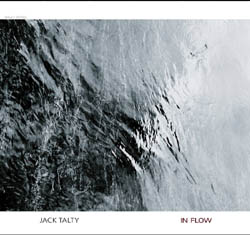
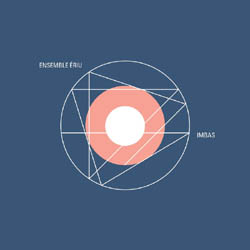 |
-
Two albums of Irish music: one excellent label, and one superb musician in common. These are busy times in contemporary Irish music as, similarly across the globe, a wealth of new music is being created by musicians. Back in October 2010, The Irish Times speculated that we are in the midst of a Golden Age of Irish music, and it is hard to argue with the evidence.
Concertina player Jack Talty's In Flow is an example of straight-ahead, no frills musicianship. Talty hails from County Clare, and his album is full of nods to his locale.
Imbas is Ensemble Ériu's second album. The title is an Old Irish word describing creativity, inspiration, and prophetic knowledge. Talty is part of a larger group here, which features fiddle, clarinets, Pguitar, double bass, flute, marimba, and drums. Each of the tracks on Imbas has a pedigree, collected by musicians and researchers from around Ireland. In Ensemble Ériu's hands, the source material is transformed into works which sound as if they were composed by the minimalist school of John Adams, Terry Riley, and Philip Glass.
Read Lee Blackstone's full reviews and listen to some songs from both albums
|
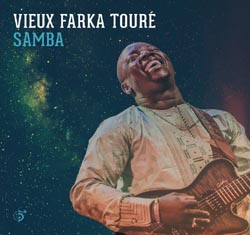 |
-
The sounds of Mali are captured and celebrated on Vieux Farka Touré's latest release, Samba. Touré returns with a balanced collection of ten original compositions recorded in front of a small audience in Woodstock, NY. This setting draws the best out of the ensemble, giving the musicians a natural confidence that is transferred directly to the record. A variety of Malian blues, funk, gospel, and a slice of reggae fill the disc with enthusiasm and purpose.
Alex Brown shares the music with you.
|
 |
-
On Saturday, April 22nd at the Berklee Performance Center in Boston, a fascinating aspect of contemporary Celtic music was on display for an extremely appreciative crowd. Boston is a central hub for all manner of Celtic music from Ireland, Scotland, England, Wales, Brittany, and Spain. But The Gloaming provided a very unique 'take' on this well loved music form. The show offered quite a bit more than the usual jigs and reels we all know so well. The Gloaming is a contemporary Irish music supergroup formed in Ireland in 2011, consisting of some of Ireland's finest musicians. With fiddlers Martin Hayes and Caoimhin Ó Raghallaigh, guitarist Dennis Cahill, Irish singer Iarla Ó Lionáird, and pianist Thomas Bartlett (aka Doveman), The Gloaming has burst onto the music scene with a distinctive new sound.
Read David Smith's full concert review.
|
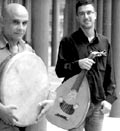 |
-
Zabad, l'écume des nuits (Zabad, Twilight Tide) is the third studio outing from the duo known as Sabîl. Oudist Ahmad Al Kathib (the project's composer and conceptual heart) and percussionist Youssef Hbeisch evoke unlimited landscapes by limited means, and here welcome the fresh continents of Elie Khoury on buzuq (a long-necked lute akin to the Greek bouzouki) and Hubert Dupont on double-bass. Although Ahmad plays in a distinctly Baghdadian style, fans of Tunisian oudist Anouar Brahem will be in good hands, as the music coaxes modern flora from traditional seeds…
Read Tyran Grillo's full review, and listen to a full song and some excerpts from the album.
|
 |
-
Zabad, l'écume des nuits (Zabad, Twilight Tide) is RootsWorld's Music of the Month selection for June, 2017. Find out how you can join MOTM and support RootsWorld's radio programs and magazine.
Subscribe Now!
|
 |
-
Many people in sub-Saharan countries, Malawi, Mozambique, and Tanzania among them, believe those suffering from a lack of skin pigmentation - or albinism - have magical properties. As a result, albinos are sold for tremendous sums and murdered for body parts… Those who manage to survive live in constant fear and deal with bullying and other misunderstandings from their neighbors… In Tanzania, the problems are so constant that many albinos have been abandoned on Ukerewe, Africa's largest inland island. And it's here that Ian Brennan - who has documented music made by survivors of the Khmer Rouge and the American war in Vietnam - made the boat journey in order to encourage these residents to write and sing their own stories, resulting in this new release by the Tanzania Albinism Collective, ironically titled White African Power...
Read Bruce Miller's full review and listen to some of the recordings.
|
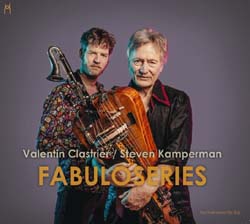 |
-
The hurdy-gurdy is already known for its unusual timbres, sometimes sounding something like a hybrid between a bagpipe and a fiddle. When it is turned into an electro-acoustic instrument in the hands of Valentin Clastrier, it flies into rather distant territory. Chorusing and other electronic manipulations bring the sound from a glorious psychedelic explosion one moment to a delicate obbligato for Steven Kamperman's superb reed work the next… Fabuloiseries is divided into five Fabulae, ranging between two and five tracks each, plus an introduction track. Although the tracks have suggestive titles, and definitely create strong moods, no program is offered, allowing the listener to create his own narrative while each of the fabulae unfolds… Listen to some examples of the series and read Erik Keilholtz' full review.
|
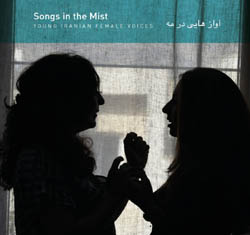 |
-
Songs in the Mist convenes eight Iranian vocalists and five instrumentalists (kamancheh, qanun, and upright bass, among other instruments) for a multifaceted celebration of song. It is an opportunity to experience the power of voices which, in their homeland, are forbidden to be heard solo. This makes the efforts of producers Erik Hillestad and Mahsa Vahdat even more significant for providing a stage on which these women might undo cultural shackles to let their individuality be known… The greatest value of Songs in the Mist, which by its variety of location and vocal delivery communicates an undeniable truth, is that these women are more than what they express, but are also what they impress...
Read Tyran Grillo's complete review, and listen to some of the music from this new set of ancient songs.
|
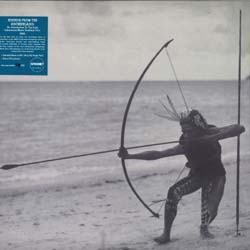 |
-
Sounds From The Archipelago: An Introduction To The Lush Indonesian Tradition, Vols. 1 & 2 is a vinyl-only-with-accompanying-CD collection that certainly could be considered an "introduction," that is unless one has already heard these exact recordings, in the exact order on a double LP set titled Music of Indonesia, recorded by Phil and Florence Walker, edited by Henry Cowell, and released on the Folkways label in 1961, something whoever is behind the Shiok! label doesn't bother mentioning. Even the photos on the back of each album are from the Folkways LP's liner booklet. What is known here is that the tracks come from Sumatra, the Moluccas Islands, Bali, Sulawesi, and Central Java. Of course, a single listen reveals how wonderful it is to have this music back in print, though it's frustrating that Shiok! couldn't have at least mentioned from where it had procured such copious musical bounty...
Read Bruce Miller's review and find out about the original sources.
|
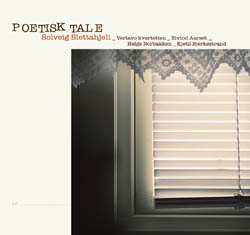 |
-
After making a name for herself on the Norwegian jazz circuit, singer Solveig Slettahjell returns with her most intimate project to date. For Poetisk Tale, she is joined by the Vertavo String Quartet, guitarist Eivind Aarset, percussionist Helge Norbakken, and keyboardist-arranger Kjetil Bjerkestrand, singing Øivind Varkøy's settings of contemporary poetry by Gunvor Hofmo, Jon Fosse, Arnfinn Haram, and Arnold Eidslott. Varkøy's binding agent is his addition of a tenth spiritual gift of "poetic speech" (poetisk tale) to the nine listed by Paul in his first letter to the Corinthians. The combination of these multiple facets yields something that feels like a memory even as it explores fresh connections between spiritual and creative living. Slettahjell sings from the heart, as if writing each melody spontaneously…
Listen to a track and some samples, and read Tyran Grillo's review.
|
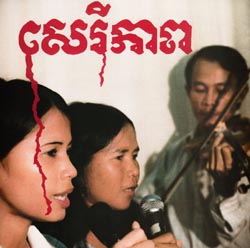 |
-
Depending on how massive a fan one is of ballad-leaning, western-influenced Cambodian pop, the story of this record's existence is likely to outshine the music. And it's a fascinating story. In the late 1970s, after Pol Pot and the Khmer Rouge had emptied out Phnom Penh, divvied up property, consigned folks to labor camps, imprisoned others in former school buildings, and ultimately wiped out some 1 to 3 million members of the country's population, an anti-communist rebel force, known as the Khmer People's National Liberation Front, appeared in resistance to Vietnamese forces now controlling parts of the country. They called a camp near the Thai border, known as Ampil, home base. And when they weren't fighting, they formed the Banteay Ampil Band and recorded propaganda songs that circulated without label support on cassette and vinyl… These have been reissued as Cambodian Liberation Songs...
|
|
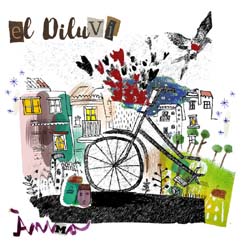

|
-
New sounds from Iberia
Valencian music has gained popularity in recent years and the Valencian folk band El Diluvi is making a name throughout the Catalan-speaking areas. El Diluvi fuses Mediterranean, Celtic, Balkan and Latin sounds on Ànima, the group's fourth release. Musically they cover the same territory made popular in the Basque Country by Gozategi, and sometimes reminiscent of Italy's La Lionetta. The seven-piece band featuring vocalist Flora Semprere, and vocalist/ violinist David Payà, began as a tribute to 80s singer Ovidi Montllor, also of Alcoi. On Motius, in 2014, the group began to develop its own signature style. And this advanced further in Alegria, with the social activism of songs such as the feminist anthem "I tu Sols tu." Here on Ànima we have eleven new tracks that explore the territory of love...
Join David Cox in Valencia.
Europe has a whole host of bands oriented around pipe and wind instruments. A whole subset of this revivalist folk genre has morphed into the predictable mash-up of loud pipe mash-ups with heavy metal, as with Germany's In Extremo. Some pipe collectives play it more 'straight,' as with Germany's Corvus Corax, or Italy's Barbarian Pipe Band. Portugal has also seen modern band experimenting with pipes and ancient instruments the progressive folk bands Dazkarieh, and Mandrágora, come to mind. Albaluna are a rising band that one might be tempted to fit in with the neo-pagan ritualist music of Europe, but like the other Portuguese bands, more is going on in the band's music than one might expect. Nau Dos Corvos is full of head-on rollicking tunes with influences that range beyond the Celtic to Ottoman and Jewish music, as well.
Read Lee Blackstone's review and listen to some of the music.
|
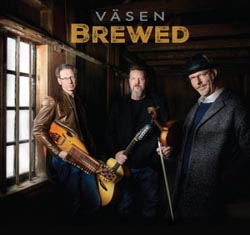
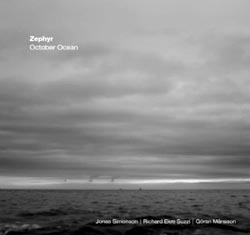

|
-
A Trio of Nordic Trios
Lee Blackstone presents three different Nordic bands that practice different approaches to traditional and composed acoustic music. Väsen and Zephyr hail from Sweden and they are made up of veteran folk musicians, while Vrang is Norwegian and represents a younger generation. All are unique and wonderful artistic trios.
Väsen surely needs no introduction after twenty-eight years together; Brewed is the band's seventeenth album under the name. Olov Johansson is the virtuosic nyckelharpa player; Roger Tallroth anchors the group on guitar; and Mikael Marin sets dreams adrift on his viola. This time out, Väsen treat listeners to a collection of original tunes…
Zephyr is configured not of string instruments, but of flutes. Görån Mansson, Jonas Simonson (from Groupa), and Richard Ekre Suzzi utilize a variety of wind instruments from Sweden and afar, such as the bamboo Bansuri flute. An all-flute trio can certainly have an ethereal sound, as the band demonstrates, but Zephyr go well beyond such stereotyping and construct compositions that indulge in global influences in their October Ocean...
The Norwegian trio Vrang features Jon Hjellum Brodal, Tuva Faerden, and Maja Gravermoen Toresen on hardanger fiddles, fiddles, lyres, and the occasional mandolin. Their full-length debut, SæterSoul, is beautifully produced, with plenty of space and depth that let the low mellow tones of the hardanger fiddle grow and the sprightly lyres shine. Vrang are notable in that they combine a minimalist approach and a sly pop sensibility…
Read about these trios in Lee's reviews, and listen to a song from each.
Vrang's SæterSoul is RootsWorld's Music of the Month selection for May.
|
 |
-
Well, I never thought I'd be writing a review that begins, "Kurt Cobain and his band, Nirvana," but there you go. These things happen.
- CF
Kurt Cobain and his band, Nirvana were never known for complex songs or rich dynamics - their formula of quiet 4 and 5 note melodies rotating with loud passages of distortion and shouting created a comforting pattern that made them famous. Cobain once said that he really wanted to play in a Pixies cover band and Nirvana did pose as the crossover point for Seattle's grunge scene onto the Billboard charts of radio pop. So it will come as a bit of a surprise to hear that hidden beneath those simple, pop-rocks tunes lie some complicated musical relationships. It took artists completely removed from Seattle, completely devoid of guitars and totally devoted to dynamics to pick out the gem-like qualities of their songs. Enter Aranis, a quintet from Belgium; players of strings, piano, accordion, flute and double bass. Smells Like Aranis tears those songs apart and reconstructs them as little works of art; sometimes pretty, sometimes weird, always intriguing…
Listen to a few tracks from the album while you read the editor's review.
|
 |
-
As titled, Reflejos Migrantes (Migrant Reflections) can be read literally as referencing the tango quartet makeup led by Buenos Aires-born, Paris-based pianist-composer Gerardo Jerez Le Cam. But this is music infiltrated by a more profound figurative connotation, the transformation of Western European culture and demography following the Soviet Union's demise, and errant U.S. adventure in the Balkans, Middle East and North Africa since the 1990s. In any case, behold a thoroughly displaced tango 'orquesta típica,' pairing Jerez Le Cam's piano with Romanian violinist Iacob Maciuca and Belgian Manu Comté on bandoneon, and replacing the traditional double bass with the Moldavian cimbalom of Mihai Trestian. Tango's own stoic purview is drawn to social dislocation wherever it manifests. Here listeners find its existential misgivings freely associated with baroque, operatic, Eastern European gypsy and jazz inventions.
Read Michael Stone's full review, and see two videos the ensemble made to accompany the music.
|
 |
-
While this disc is touted as the fourth by Ialma, the Galician pandeireta quartet of female voices and percussion, Camiño is a close collaboration between Ialma, the well-travelled and versatile diatonic accordionist Didier Laloy, and Quentin Dujardin, a sort of Belgian Pat Metheny. Both Dujardin and Laloy are prolific, and have performed in a number of formats and genres. This appears to be a new direction for both of these exceptionally seasoned, sensitive and gifted performers, and a nice addition to the sound Ialma has previously explored. On the thirteen tracks of Camiño, the two Belgians back the quartet, highlighting Galician vocal music with some beautiful four-part harmonies, in a joyful take on Galician tradition. Listen to a full track and some excerpts from the album while you read David Cox' review.
|
 |
- The cool aesthetic of Bandakadabra is immediately evident by their matching black suits with white shirts and skinny black ties. Their music twists and turns from playful and suave to serious and methodical in an instant. Dubbed an "Urban Brass Band," this ensemble from Torino, Italy sets their sights on all sorts of brass music, from ragtime and jazz to Balkan, rocksteady, and Latin on their rousing live recording, Entomology. A call to attention preludes "Skaravan," which cranks ups the tempo with a delightful ska version of "Caravan" that jumps off the stage and gets the audience skanking. From there they head on to Goran Bregovic and more Duke Ellington, and dip into blues, jazz and classics from Brazil, Mexico and Cuba along the way. Listen to a few tracks and read Alex Brown's review.
|
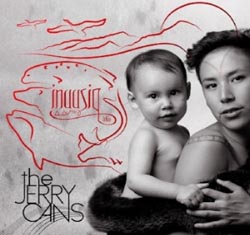 |
-
The Jerry Cans are a phenomenon in Iqaluit, capital of the Inuit territory of Nunavut, and across Inuit territory which stretches across the North of Canada, Alaska, Greenland, and Siberia… Musically the format of Inuusiq/Life is an upbeat Alt-Canuck blend of folk, pop and country, reminiscent of Willie P Bennett or Kashtin. The most interesting aspect of the five-piece group is their homage to Inuktitut, the traditional language of the Nunavut territory. Nine of 10 tracks are in Inuktitut, the last in English.
Read David Cox review and hear some of the music.
|
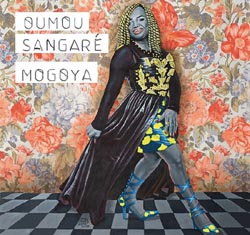 |
-
27 years after her debut, Moussolou - an album straddling tradition and modernity that featured daring lyrics denouncing polygamy and instead calling for female empowerment, made her an instant star in Mali and elsewhere - Oumou Sangaré's sixth LP, Mogoya, continues that conversation. In some ways she hasn't changed at all. With grooves infectious enough to rattle a pop music skeptic, she sails over rhythms and melodies that, no matter how dressed up in European production sheen, never truly betray her Wassoulou-region roots. In the eight years since her last release, she's continued touring, running a hotel in Bamako, branding her name on rice as well as automobiles, and all the while demonstrating the power women have in place where female circumcision is still performed and education isn't necessarily a priority. She's working with a new label, and they produced her in way that certainly felt new to her. Sure, there are synths, distorted electric piano lines, and electric guitars that often snake in and out of the mix. There's also Tony Allen, whose unmistakable drums provide a foundation no sample could every equal. But she still hangs tightly to the kamele n'goni, the karignan, and the calabash, and it's these instruments that typically drive the tunes...
Bruce Miller delves into the complex crossing of boundaries in the music of Oumou Sangaré. Read and listen.
|
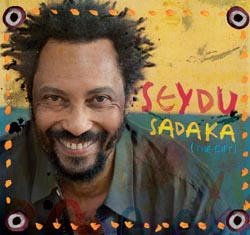 |
-
One of the most attractive elements of any recording is the expression of joy. Seydu's third disc, Sadaka (The Gift), has this quality in full measure. Seydu, born Anthony Zachariah Jalloh, emigrated 'illegally' from Sierra Leone to Spain, and records songs in Krio, English and Spanish. His world music rhythms have elements of maringa, but the sensibility is a general West African one rather than one limited to a particular country. The involvement of Joe Dworniak, an experienced bassist integrated into the Spanish/Latin music scene, and producer Hugo Westerdahl, who knows the music of the Saharan regions, means the music nicely blends a lot of these influences...
Read David Cox review and listen to some of the music.
|
 |
-
Finland is no stranger to cultural fusions. Russia, Sweden and Germany have all made their political incursions over the centuries, just about everyone has dropped by for a visit at one time or another. So it stands to reason that this linguistically isolated country would absorb a lot of music as it passes by… Band leader and vocalist Jaakko Laitinen, from the northern city of Rovaniemi in Lapland, and his band of horns, bouzouki, accordion, bass and percussion called Väärä Raha, let influences fly fast and loose on a series of original songs that bounce from wistful romance to dire insanity. You'll hear classic Balkan brass, the hyper-foxtrot of the Finnish huumpa, Russian balladry, and the rigid tango that has made summer nights in Finland famous.
Your editor chimes in on this one, and I've included a full track and some short excerpts.
|
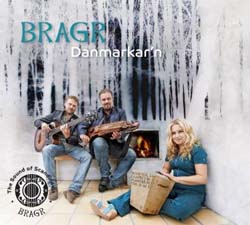 |
-
"Danmarkar'n, The Man from Denmark, refers specifically to the village of Danmark in Uppland, Sweden. This waltz kicks off the debut record from Bragr, and trio of two Danes and a Swede. Many of the tunes on Danmarkar'n are traditional, but I'm enthralled by the non-traditional yet firmly rooted approach this trio takes," writes Greg Harness in his review of their new recording.
|
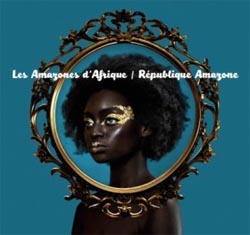 |
-
Les Amazones d'Afrique is an impressive collective of female musicians from West Africa who are working towards ending gender inequality. The group includes Angélique Kidjo, Kandia Kouyaté, Mamani Keita, Mariam Doumbia, Mariam Koné, Massan Coulibaly, Mouneissa Tandina, Nneka, Pamela Badjogo, and Rokia Koné…. République Amazone will split listeners. On one hand, the adventurous contemporary approach utilizing samples and effects in a psychedelic, funky dub that is heavily influenced by the producer will appeal to those who are looking for something different. On the other hand, the production takes over the mix, which in turn often marginalizes the vocalists who are the stars of the project…"
Alex Brown looks into the pros and cons.
|
|

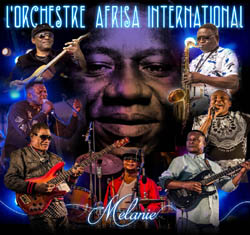
|
-
New roots and welcome old routes
Seydou Diabaté, aka Kanazoé, unleashes his technique on the balafon with a talented ensemble on Kanazoé Orkestra's debut full-length release, Miriya. Born in Burkina Faso and now based in France, he and his band offer an impressive, mature record that maintains urgency throughout… Kanazoé provides some of the vocals and plays a variety of balafons. His group includes Zaky Diarra on lead vocals, Mamadou Dembélé on ngoni, flute, and vocals, Martin Etienne on saxophones, Stéphane Perruchet on percussion, Elvin Bironien on bass, and Laurent Planells on drums. Alex Brown's review finds a band that sets the bar high and delivers, with confidence and joy.
The late Tabu Ley Rochereau had a talent for picking great musicians. Just before Rochereau died in 2013, he asked his long-time sax player Modero Mekanisi to keep L'Orchestre Afrisa International going. The eventual result was Melanie, the band's first release in many years. While the unhurried but compelling grooves nostalgically echo west Africa's older, pre-soukous Congolese rumba dance styles, the uniformly meticulous playing is a treat for long-time fans.
Marty Lipp shares the music of a band that carries on.
|
 |
-
Charanga's Tributo'ó Ti Tobias is a peculiar kind of tribute album. Styled as a musical homage paid to an Uncle Tobias, a sort of older everyman, the album pays tribute to the long history of Portuguese folk music that has come before it. However, this isn't the pristine folk of ethnomusicologists or world music connoisseurs but the lively tradition of summer village parties with cheesy up-tempo beats and corny lyrics played by stocky mustachioed men and scantily-clad ladies. Charanga's use of such pimba music (essentially a Portuguese version of schlager) is as jarring as it is tender: their message is not political as such, but it does evoke a particularly inclusive concept of Portuguese folk music that encompasses a vast terrain of instruments and traditions, from bagpipes to synthesizers... Rosa Vieira de Almeida takes us into the strange world of Charanga.
|
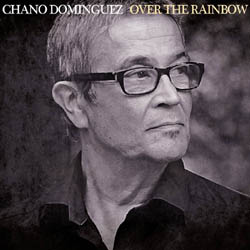 |
-
Michael Stone had a chance to chat with Spanish pianist-composer-bandleader Chano Domínguez about his latest recording, Over the Rainbow. Domínguez's new solo recording, draws from a live performance in Barcelona, combining Latin American canciones with his original compositions and pieces by Thelonious Monk, Harold Arlen, and John Lewis. Domínguez observes, "Latin American popular music has been part of my life for a long time. These are profoundly expressive songs that I developed a deep feeling for from my youth."
Read their conversation, and Michael's review, while you listen to some of the music from the album.
|
 |
-
The titles say it all:
Bitori: Legend Of Funana: The Forbidden Music Of The Cape Verde Islands
Space Echo: The Mystery Behind The Cosmic Sound Of Cabo Verde Finally Revealed
Synthesize The Soul: Astro-Atlantic Hypnotica From The Cape Verde Islands 1973-1988
Bruce Miller investigates three recordings that explore the 20th Century sounds of the these Atlantic Ocean islands off the North African coast, from accordion driven dance music to synthesizer centered pop.
|
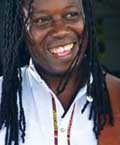 |
-
Aurelio Martínez is arguably Central America's most gifted and vibrant musical talents, a key tradition bearer of one the most threatened cultures of the isthmus, the African-Amerindian Garifuna people. Apprenticed from an early age to his cultural elders, later a collaborator of Garifuna masters Paul "Nabi" Nabor (19282014) and Andy Palacio (19602008), Aurelio is the foremost champion of the music, dance and language traditions… With its emphasis on vocal artistry, polyrhythmic complexity and dense percussive base, Garifuna music speaks across the African diaspora to its Central American, Caribbean and Latin America counterparts, rooted in the sacred ancestor spirit-possession drumming, song and dance genres of the ritual dügü, consonant with analogues in Cuba, Brazil, Haiti, Jamaica, Trinidad and elsewhere... A mature expression of Aurelio's decades-long sojourn, Darandi is a definitive rendering of some of his most compelling original and traditional Garifuna material, in a new recording made live at Real World Studios in England.
Read Michael Stone's full review of Darandi, and listen to a full song from the album, a song made famous by his mentor Paul Nabor.
Darandi is RootsWorld's Music of the Month selection for March, 2017. Find out more.
|
|
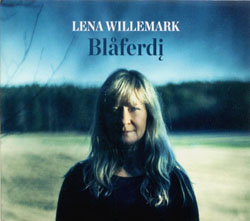
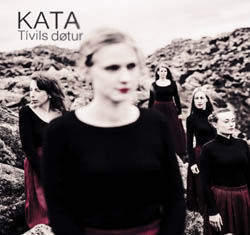
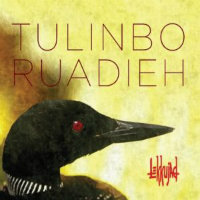
|
-
The treasure of language
Here are a few recordings that explore the power of language; in this case, some lesser know tongues of Europe and the Atlantic. Languages all have their own unique rhythms and meter that are reflected in both the poetry and in the music itself. These three artists offer us a glimpse into their very local worlds, singing (and, in effect, playing) in Karelian, Älvdalska and Faroese. - CF
First is a very special recording of music from Sweden, by one of its most interesting and important artists, Lena Willemark. As Lee Blackstone writes, "Blåferdį (Blue Journey) is a mesmerizing album from an always adventurous Swedish singer and violin player. To realize this work, Willemark wrote a series of poems, in Swedish and in Älvdalska (also called Elfdalian, an ancient Swedish language) which she set to the sounds of a quintet - Willemark on vocals and violin; Emma Reid on violin; Mia Marin on 5-string violin; Mikael Marin on 5-string viola; and Leo Sander on cello; plus percussionist Tina Quartey on numerous drums and bells… The music and singing is quite simply, astonishing. The strings act like roots, anchoring these songs, the cello another dark timbre. Quartey's percussion never overwhelms the delicacy and force with which the quintet maneuvers through Willemark's compositions."
In addition to Lee's full review, we have a full song and some excerpts from the album. Ms Willemark also contributed a few words explaining how she came to perform the entire work in Älvdalska (Elfdalian), an ancient dialect from her home region of Älvdalens, in Sweden. And we have a short video of her telling the nativity story in the language. Read the full article.
The next recording comes from a quintet of vocalists from the Faroe Islands. Kata is an all-female vocal quintet hailing from, and arranging folk tunes of their islands. Kata's precise, rooted singing will appeal to fans of Trio Mediaeval, but they are also influenced by Bulgarian choirs like Le Mystère des Voix Bulgares. The album's tone tends toward cautionary tales of injurious traditions and social mores, as codified in folk stories handed down for generations. Occasionally accompanied by electronics and percussion, the listener is offered a dip into forgotten waters, an experience of vivid melodic and lyrical shapes on Tívils Døtur.
Listen to the music and read Tyran Grillo's full review.
Finally, we offer you an audio feature of the music and songs of Karelia, as reinterpreted by Lekkujad, a quartet of musicians based in Helsinki that are exploring new ways to hear music from Karelia, a region that spans the Finnish-Russian border. These four musicians have diverse backgrounds that come together to create something unusual for Karelian music. Listen to a few tracks from their new recording, Tulinbo Ruadieh.
|
 |
-
Singer, guitarist and song writer Lula Pena is one of the most iconoclastic artists of Portugal. She is often referred to as a fado singer, but that's sheer laziness on the part of those looking for simple pigeonholes to place their expectations in. There is certainly the independent spirit of fado in her music; the old school variety punctuated by cigarettes and late nights; the cousin of the blues, the rembetiko, the morna, and the Appalachian ballad. But Pena stands apart, and shows how far on her latest recording, Archivo Pittoresco.
See a video of one song and a live performance, and read Cliff Furnald's review.
|
 |
-
French trio Bey.Ler.Bey are mistranslaters of sorts. Composed of accordionist Florian Demonsant, percussionist Wassim Halal, and clarinetist Laurent Clouet, the group showcases a collective knowledge of what they call the "colors and codes of Balkan music" while embracing certain conventions of free jazz and minimalism. On Mauvaise langue, they conspicuously eschew traditional elements through a kind of upside-down and backwards jigsaw puzzle, fitting sounds together that seem like they've always coexisted. However, the mercurial qualities of each voice betray a newness of vision.
Listen to the songs and read Dylan McDonnell's review.
|
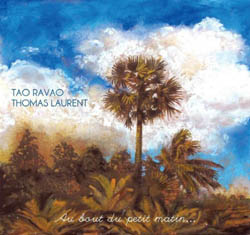 |
-
Like countless projects before it, Au bout du petit matin ("In the wee hours") lines out the possibilities of joy and sorrow through a collage of instrumental and vocal means. However, Malgache artist Tao Ravao and French musician Thomas Laurent fulfill their vision by offering a window into primarily Francophone and Francophone-associated tunes… The choice of instrumentation for this project, as well as the song material, is highly associated with either French postcolonial or stereotypically "French" sounds: Ravao plays both guitar and kabosy, a box-shaped wooden guitar common in musics of Madagascar, while Laurent sports a twelve-hole chromatic harmonica not dissimilar to the voice-like emotionality popularized by musicians like Toots Thielemans and Gregoire Maret. The duo dissolves and rebuilds its sound piece by piece as it creates allusions to disparate musical contexts.
Read Dylan McDonnell 's review and listen to some songs from the album
|
 |
-
"I'm going to tell you a long story about Shirley Collins and English folk music. To do so, follow me back to before Shirley Collins was born to around the turn of the twentieth century…" Shirley Collins' Lodestar, her first recording in 38 years, was published late last year, and both Lee Blackstone and your editor picked it as one of our favorite releases of 2016. Join Lee as he walks you through the story of this most interesting and enduring folk music legend, in his article about English folk music, Ms. Collins and her highly anticipated return to singing. There are also three beautiful video pieces to accompany his story.
|
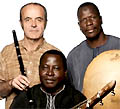 |
-
The folk world has its projects whereby musical connections are made which heighten awareness concerning the indebtedness different cultures have to one another: in that spirit, parallels and future avenues are explored… The trio Serendou, are in this excellent tradition of cultural exchange, when two musicians from Niger meet with a Breton flautist in Zinder. Serendou are comprised of Yacouba Moumouni (flute, vocals), Boubacar Souleymane (singer, percussionist, guitar and kountigui a one-stringed lute), and Jean-Luc Thomas (ebony flute, electronics, vocals)… Zinder's substance is thrilling on several counts. The musicians go deep into Nigerien music.. tunes shimmer, and the flute playing brings to mind the circularity that one hears in Breton music a round, call-and-response rhythmic sway that characterizes a lot of the album…
Lee Blackstones explores the invisible borders.
|
 |
-
Finnish folk music can sound other-worldly. The country's folk-epic, "The Kalevala," compiled by Elias Lönnrot in the early 1800s era of nationalism, features ancient and stunning poetry that sounds as if it were forged by mountains and rivers. "The Kalevala" is laced with charms and spells, and its impact on Finnish folk culture has been immense. One can hear its echoes in this new recording.
Okra Playground formed in Finland in 2010, and Turmio is the group's debut recording. Three female vocalists are up-front in Okra Playground's sound, which lends thrilling dynamics to their chosen material. Both play the kantele, strung over their shoulders for a twin-stringed attack that any heavy metal band would envy. The men in the band round out the contemporary sound with bass, synth, accordion and percussion. Comparisons to both Värttinä and Hedningarna are inevitable. Okra Playground has an organic, acoustic base, but they frequently add electronic enhancements so that their overall approach appeals to both traditionalists and experimentalists.
Read Lee Blackstone's full review and listen to the music.
|
 |
-
For a number of reasons, Niger strikes many as a difficult place to penetrate. It's brutally hot, largely desert, landlocked, and dauntingly vast. Over the last 13 or so years, it's also experienced it's share of coups, drought, and threats from within and without. This is the information that often gets expressed through various media outlets, and while these concerns are real, the country is also experiencing a musical flux. Alongside centuries old traditions are cell phones and the internet, which are forcing shifts. Niger has had some aural anomalies for quite some time, with releases of Mamman Sani Abdoulaye's late 1970's synthesizer experiments, as well as early 70's recordings by Azna de L'ader. Tuareg guitar rock, found in the Agadez region, and recorded over the last decade or so, has also seen plenty of attention…
Which all brings us to Studio Shap Shap. This six-piece ensemble, based in the nation's capital Niamey, does what so many young bands from more cosmopolitan areas of the world are doing; they're synthesizing tradition with a more experimental approach. On Chateau 1, the komsa lute, balafon, and the Hausa talking drum known as the Kalangou, blend with electric keyboards, electronics, snippets of field recordings and musical patterns not normally associated with the country's roots, for something that captures the country's musical flux perfectly…
Listen to the music and read Bruce Miller's full review.
|
 |
-
Based in Prague, Czech band ba.fnu meet with legendary Breton singer Yann-Fañch Kemener on a remarkable project called YFK 2016. ba.fnu are a young band playing cittern, hurdy-gurdy and other stringed instruments, percussion and some computer programming. They have an affinity for both Czech and other European styles, but especially Breton fest-noz tunes. Yann-Fañch Kemener is famous for helping to revive Kan ha diskan, the Breton vocal style that accompanies dancing. The Czechs bring a contemporary modern aesthetic to their arrangements, which can described as traditional music incorporating urban street sounds. Kemener's vocals circle through the mix and add a trance-like quality to the tracks.
What the musicians aim to achieve here are not merely danceable songs, but experimental sound-art. YFK 2016 is meant to be experienced as a sonic calendar, with a distinct political message. They combine this all with spoken word samples continually throughout the music and these provide a running commentary on international affairs…
Read Lee Blackstone's review and listen to a few of the songs from this Czech/Breton 'calendar.'
|
 |
-
As unlikely as they are talented, the members of Doolin' are French musicians playing Irish music, recording on a Nashville-based record label. Formed in 2005 in Toulouse by six musicians from widely different backgrounds but united in their love of Irish music, the group's newest album shows little trace of their native land, with lyrics principally in English. The group mostly plays instrumentals, propelled by bodhran playing and percussive guitar work. They also add heartfelt vocals in songs like Bob Dylan's "Ballad of Hollis Brown" and Steve Earle's "Galway Girl." The group has produced an album that should be welcome to fans of high-energy modern traditionalists such as Solas, Lunasa and Flook…
Read Marty Lip's complete review and listen to some of the music.
|
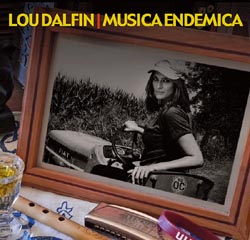 |
-
"You can lose the battle, you can even lose the war; but what counts is having fought."
The Occitan speaking lands of Italy have brought forth their fair share of contemporary and folk musicians, and of these Lou Dalfin is probably the longest-lived and best-known band. On Musica Endemica, their thirteenth album in 35 years, Sergio Berardo's band continues on its folk-rock course - especially if you consider the hurdy-gurdy a rock instrument. It's been five years since their last effort, and it's certainly worth the wait…
Hear some of the music and read David Cox' full review.
|
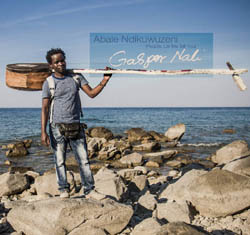 |
-
I thought my knowledge of global music instruments was fairly comprehensive. Then I took a look at the thing balanced on the shoulder of Malawi's Gasper Nali in the cover photo of his album Abale Ndikuwuzeni. I'm sure I'm not the only one who, at first glance, wondered why this fellow didn't take up the harmonica. But I'm open-minded and open-eared, so I had to find out what this bizarrely beautiful axe could sound like. Turns out it's called a babatoni and is Nali's own creation. With its cow skin drum resonator, single string and very, very long neck, it may look like a surrealistic representation of a giraffe but sonically comes across rather like a Brazilian berimbau. The babatoni's sole string is struck with a stick held in Nali's right hand while his left moves an empty glass bottle along the string in order to vary the tone. The effect is melodic in a rudimentary sort of way, producing a shimmering, rise-and-fall metallic buzz that you might assume to be electronically created if you hadn't already gotten the visual.
Read Tom's full review and listen to a few songs from the album.
|
 |
-
Transparent Water occupies space within several different spectra: between plucked and hammered strings, spontaneous and preconceived composition, wandering and purposeful trajectories. Its fluidity reflects a continuity of Cuban pianist Omar Sosa's vision of transcontinental blurring of styles and idioms in an ultimately Afro-diasporic framework. This time around Sosa has partnered with Senegalese kora player and singer Seckou Keita to engage a project of exploratory proportions: the album features elements of multiple African regional musics (Mandinka and Yoruba), Chinese reed timbres, Japanese koto playing, and the Afro-Latin piano and percussion canons.
Read Dylan McDonnell's review, and listen to a full song and some excerpts from the album.
|
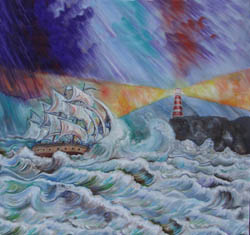 |
-
Describing themselves as "a sort of truncated nautical B-movie featuring a cast of characters raided from Hollywood's worst costume department," Seas of Mirth are a band of merry pranksters sailing the 'pirate folk' subgenre. Pirates are perhaps themselves the ultimate subgenre, and pirate-related themes crawl from the seaweed in many metal and folk-rock oriented bands. Seas of Mirth do the developing scene credit on their second full-length album Hark! The Headland Approacheth…
Read Lee Blackstone's review and sing along.
|
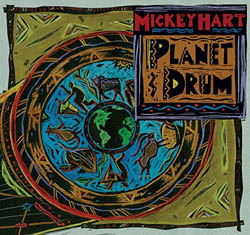 |
-
Celebrating its 25th anniversary, Planet Drum has been remastered in a special edition with three previously unpublished tracks. In 1990, Mickey Hart assembled a cast of musicians from around the world to make a percussion album unlike anything ever produced. Hart was joined by Zakir Hussain and T.H. "Vikku" Vinayakram from India, Babatunde Olatunji and Sikiru Adepoju from Nigeria, Airto Moreira and Flora Purim from Brazil, and Giovanni Hidalgo from Puerto Rico. Planet Drum was released in 1991 and spent twenty-six weeks at the top of the Billboard charts, winning the first World Music Grammy. Instead of writing compositions in a particular style, Hart wanted the musicians to bring their traditions to the studio with the goal of creating new rhythms and ideas in an open-minded environment. The results speak for themselves…Join Alex Brown in revisiting a classic percussion album.
|
 |
-
On The Magical Forest, Norwegian kantele virtuoso Sinikka Langeland reconvenes her "Starflowers" quintet (with saxophonist Trygve Seim, trumpeter Arve Henriksen, bassist Anders Jormin, and drummer-percussionist Markku Ounaskari), adding to that quilt the patchwork of voices known as Trio Mediæval. Any of these names will be familiar across the spectrum of ECM followers, but their shared love for Scandinavian folk music has never been so clear as in this latest project. In contrast to previous albums, the kantele is a largely supportive presence, almost airy in its backgrounded-ness. This gives Langeland's unaffected singing - and, more importantly, the imagery laced into it - room to roam.
Read Tyran Grillo's review and listen.
|
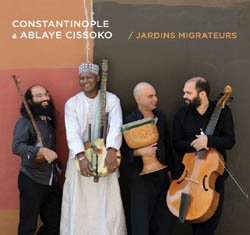 |
-
Constantinople, formed in Montreal in 1998, comprises Kiya Tabassian (voice, setar), Pierre-Yves Martel (viola da gamba) and Ziya Tabassian (tombak, percussion). Over the years the ensemble has collaborated with the likes of Frank London, Loren Sklamberg, Savina Yannatou, and many other artists from Mexico, Spain, Italy, Greece, Turkey, Iran, India, China, Mongolia and Uzbekistan. Joining Constantinople on Jardins Migrateurs is Senegalese kora player, singer and composer Ablaye Cissoko, who hails from a line of Mandinka griots. The project's conceptual "itinerant garden" cultivates a spiritual communion wherein Persian strains (the Tabassians were born in Teheran) engage West African and Western classical elements on mutual aural terrain. Viola and percussion underpin the kora, setar and voice, fostering a deferential exchange that conjures sonic beauty through graceful simplicity.
Michael Stone reviews and shares some of their music with you.
|
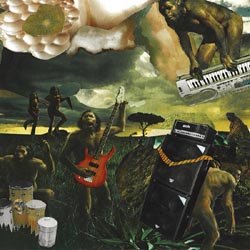 |
-
Los Lichis's story isn't particularly unique, in that it involves a few friends meeting at college, picking up whatever instruments that might be lying about and forging their way toward something that, as far as they're concerned, is unique. Yet because core members Manuel Mathar and Geraldo Monsivais met in the 1990s, far after the innovations of kindred experimentalists in early 70s Germany or Japan, not to mention the LAFMS, and perhaps also because they attended the University of Monterrey, in Mexico, and not an art school in LA or NYC, their story becomes a bit more intriguing… Mathar and Monsivais, along with another friend, Jose Luis Rojas, found themselves with a shared interest in getting way out there, with - amazing for the end of the 20th century - not much in the way of record collecting geekdom as reference points for what they wanted to do. Fortunately for us, the record button was on and this collection, spanning the decade between 1997 and 2007 and culled from CDRs and cassettes, is a fantastic trip into the nether regions beyond pop music's limitations…
Go on a sonic adventure with Bruce Miller and discover music that lacks any boundaries.
|
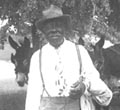 |
-
The music of Washington Phillips and his unique instrument remains singular, easily separated from the multitudes of blues and gospel records recorded in the rural, black, early 20th Century deep south. The ghostly twinkles of Phillips' double zither, the manzarene, caressing a voice seemingly devoid of hurry, carried by the clouds, have only grown more unusual, seductive, and softly brazen with time. Steeped in gospel's oral tradition, but floating on his own instrumental innovations, Phillips created some early genre-defying folk minimalism.
Bruce Miller introduces you to Washington Phillips And His Manzarene Dreams, the latest book and CD set from the ever-interesting Dust To Digital label.
|
 |
-
Bruce Molsky is a veteran of American string bands and transatlantic sessions. Arto Järvelä is on more recordings than one can keep track of, and it was Norway's Ånon Egeland has opened many ears to how musical a munnharpe can be. Rauland Rambles, recorded at the 2016 Rauland International Winter Festival in Norway, contains a great mix of Norwegian, Finnish, and American traditional tunes in various combinations of fiddle, hardingfele, ukulele, kantele, banjo, munnharpe, and seljefløyte…
Greg Harness finds this cross-cultural collaboration to be a treasure.
|
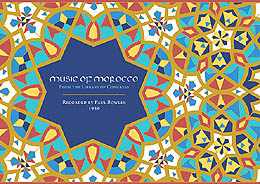
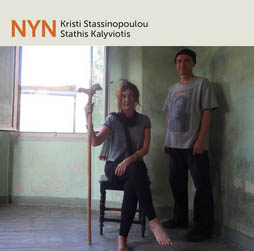
|
-
I asked a number of our writers to tell you about some of their favorite recordings and overlooked gems from 2016. Marty Lipp wrote, "It was tough, dispiriting year, but there were some bright spots among the new releases of 2016. Artists - some from very troubled nations - showed us that hope and joy are available with a willful turn of our proverbial internal dial."
In the first installment, we'll hear from Marty (ML), Michael Stone (MS), Alex Brown (AB), Tyran Grillo (TG), Greg Harness (GH) and your editor, Cliff Furnald. Volume 2 has picks from Lee Blackstone, David Cox and a bit more from the editor. They are not ordered by "greatest" in any fashion, but are simply the picks of a number of our writers, randomly presented to allow you to wander through the world of music they represent.
Volume 1
Volume 2
|
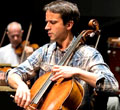 |
-
Uh-oh. Thrace. The gateway between East and West, Europe and Asia. Western trained musicians playing with near-Eastern traditions. Peace. All that crap. By now we know the drill: bloody cellist plays plaintive melodies ripped off from some exotic locale. Rimsky-bloody-Korsakov lives! Chinoiserie Uber Alles and all that. The cultural theorists can scream "appropriation!" The purists can sniff and snort... But then there is the music. Oh, there is the music... Crisp rhythms, expertly phrased, intelligently composed. Intriguing harmonics (especially on "Zarbi & Shustari", which uses a very Thracian-style violin on an Iranian melody, to great effect), gently pulsing drums, subtle melodic variations. Jean-Guihen Queyras leads his quartet, with Sokratis Sinopoulos on lyra and Bijan & Keyvan Chemirani on percussion on Thrace: Sunday Morning Sessions.
Erik Keilholtz shares a few asides, and even his thoughts on the music.
|
 |
-
"The enemy is clearly delineated: he is a perfect model of malice, a kind of amoral supermansinister, ubiquitous, powerful, cruel, sensual, luxury loving…. He wills, indeed he manufactures, the mechanism of history, or tries to deflect the normal course of history in an evil way… The paranoid's interpretation of history is distinctly personal: decisive events are not taken as part of the stream of history, but as the consequences of someone's will." - Richard Hofstadter, "The Paranoid Style in American Politics"
Real Enemies - the big-band production of Vancouver-born, Brooklyn based composer and bandleader Darcy James Argue - is a prescient title for these, our times. It draws inspiration from the work of historians Kathryn Olmsted - who explores U.S. popular fascination with conspiracy theories in her book "Real Enemies" - and Richard Hofstadter, excerpts from whose essay quoted above percolate through this new work… Peppered with audio cameos by Cold War and "intelligence community" household names, under his direction, Darcy James Argue's Secret Society conveys the ambiguity, obsession, psychosis, nagging dread, and Twilight Zone menace-with-a-moral…
Michael Stone takes you inside a powerful new North American work.
|
 |
-
What is the artistic response to uncertainty? Musicians from across the United Kingdom have been asking this question since the Brexit vote, as have those from the United States since the 2016 Presidential election. To find answers, one strategy is to look at the creative community's response from places that have suffered greatly. In many of those spaces local artists have come forward with expressions of sorrow and loss yet also offered a path toward resilience and revival. Often that path looks both backward and forward… With the release of Amira Medunjanin's Damar, Greg Harness explores the path of Bosnian resilience as expressed by the sevdah musical tradition
|
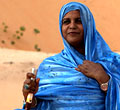 |
-
With its distorted electric guitar, wailing vocals, and a drummer that keeps it all in sync, the album Arbina sounds free, explorative, even trippy, like a young artist who has found her groove through the mostly harmless mischief of a road-bound rebellion, but could one day bloom into an M.I.A.-style revolutionary. It's not all quite what it seems. This is Noura Mint Seymali's second international release after a lifetime of performing at public ceremonies and on record in her home country of Mauritania. She's a seasoned descendant of more than twenty generations of Moorish griot, a social caste of Saharan musicians and performers. Like the griots before, she dresses in a head-to-toe mulafa, singing lyrics that sit on the shoulders of God, country, culture and tradition, along with the hope and blessings they bring forth…
Nokware Knight shares the work of an artist who sings without compromise.
|
 |
-
The River is a collaboration of forces between the ETHEL string quartet and Native American flute player/maker Robert Mirabal. The recording sessions took place under the open skies of Taos Pueblo, New Mexico, the surroundings of which are referenced by a dusting of field recordings. Wind and water, for instance, harmonize in the ambience of opening track "An Kha Na." Its blend of indeterminate and composed sounds makes the introduction of strings and the singing of those playing them seem like something from another plane of existence. An overwhelming impression of distance prevails when the song transitions into "Tuvan Ride" through sounds of horses. While this jump from an American heritage site to the Mongolian outback might seem arbitrary in theory, in practice I can hardly imagine a clearer manifestation of the album's title. Here the river is no metaphor, but the very interconnectedness of life on Earth.
Read Tyran Grillo's review and listen to a full track and some audio excerpts.
|
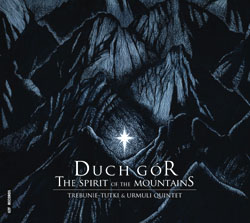 |
-
A Polish folk group institution, Trebunie-Tutki have been releasing recordings since the early 1990s. Based around family (lead Kryzysztof Trebunia-Tutka, on violin, flutes, bagpipes, and wooden horns, and Anna Trebunia-Wryrostek, on cello, are brother and sister), Trebunie-Tutki practice the 'góral' music of the Polish highlanders. Over the years, Trebunie-Tutki have not only performed traditional material, but they have also experimented with musicians from other cultures… Trebunie-Tutki's latest exploration on Duch Gór: The Spirit of the Mountains is with the Quintet Urmuli, a group that has been performing for twenty-five years, and who hail from Tbilisi, Georgia.
Listen to the music and read Lee Blackstone's review
|

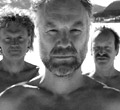
|
-
New Nordic Roots
Groupa holds traditional Nordic folk music in high regard, but they are not afraid of breaking down boundaries and re-creating well established songs in their own way. The trio has been combining the traditional with a curiosity for the experimental for over 30 years. This often means using instruments that are out of the ordinary, including wood, stone and bells. Maria Ezzitouni talked with violinist Mats Edén about the history of the band, what makes them successful, and about the criticism they have faced by striving forward on their own path.
Groupa mixes Nordic folk music with new thinking and innovation on their tenth album, Kind of folk - vol. 1 Sweden. Most of the tracks are their own interpretation of long-established folk traditions from Sweden, with a few pieces composed by the trio of Terje Isungset (percussion), Jonas Simonson (flutes) and Mats Edén (violins).
Read Maria's review of the recording and listen to some songs and samples.
|
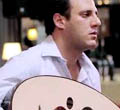 |
-
Issa Murad, a Bethlehem native, developed his chops (oud and voice) at the Edward Said National Conservatory of Palestine, furthering his career in Cairo for a couple of years before moving on Paris in 2007, where he wrote an ethnomusicology thesis at the Sorbonne and dove into the city's cosmopolitan musical milieu. In Paris, Murad formed the ensemble Joussour in 2012 as an experimental sextet whose Arabic meaning is "bridges," an apt metaphor for his compositions, which explore connections between the improvisatory bent of Arabic, Syrian, Turkish, Balkan, Indian, Latin and world jazz sonorities. On the album Joussour,
Michael Stone finds a world of illuminating improvisation, awaiting those who seek a different kind of different.
|
 |
- Greg Harness writes, "I love a good anti-Nashville anthem. And I especially love "Z," from a self-described "half-gringa, half-Chicana, fiddle-playing Carrie Rodriguez." It's a rollicking honky-tonk song, underscored by a message of perseverance ("Doors are gonna open if you want them to / But you might have to knock 'em down"), and it fits my mood these days." Her new CD Lola shows off the "the ranchera side" of Rodriguez musical personality with "hard hitting original songs and striking takes on classics wrapped up in a message of perseverance and hope," making this one of Greg's "Best of 2016" recordings.
|
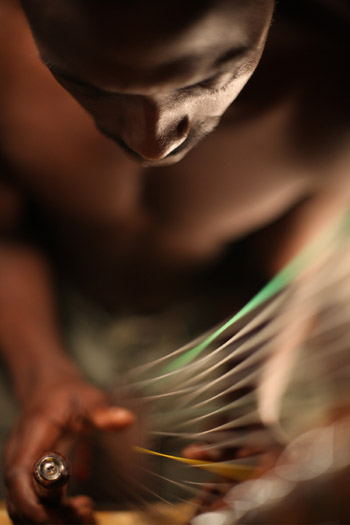 |
-
Gambian multi-instrumentalist Dawda Jobarteh and his top-notch band of Danish, Cameroonian, Ghanaian, Cuban, and Gambian musicians embrace an accessible fluidity of styles, and thus emotions, on Transitional Times. The album centers on Jobarteh's masterful playing on the kora, the Mandinka West African harp that has became a staple piece of transnational "world music" projects. His group's particular matrix of plucked strings, electric rock instrumentation, spiritual jazz, and a loosely unifying theme allows them to toy with labels and stereotypes while opening into less-trodden ground.
Despite belonging to a lineage of lauded jaliya or griots who helped spread recognition of the kora beyond West Africa (including his grandfather, Alhaji Bai Konte), Jobarteh only began to focus on the kora after relocating to Denmark, having initially studied the calabash in the Gambia. However, he exhibits all of these skills on Transitional Times, which embraces both songs from the jaliya tradition, as well as original and adapted compositions that incorporate other idioms.
Read Dylan McDonnell's full review online now, along with many musical examples.
|
|



|
-
Three Audio Features
First, we take you to Viljandi Folk Music Festival in Tallinn for a concert with Estonian artist and singer Mari Kalkun and her ensemble of Finnish players, Runorun. The quartet plays variants of the stringed zither common to northern Europe, called kannel, or kantele, along with double bass and percussion. The concert was performed on April 1st of 2016, at Tallinn Music Week, part of the Viljandi Folk Music Festival Showcase. Listen!
Next, a group of musicians from Bristol, England who call themselves Three Cane Whale. These recordings were made in the Old Barn in Kelston, Roundhill, in the south of England, between Bristol and Bath. They play what the ensemble calls folkish minimalist miniatures. The musicians are Alex Vann (mandolin, bowed psaltery, bouzouki, zither, music box, etc), Pete Judge (trumpet, harmonium, dulcitone, glockenspiel, lyre, etc), and Paul Bradley (acoustic guitar, harp, etc). We begin with a set of three pieces that all feature the words and voice of their guest, Jon Hamp and then carry on from there. Listen!
Finally, we hear Albaluna, a folk music ensemble that uses medieval and early folk music from Portugal, and merges it with Turkish and Balkan sounds. We're going to listen to a suite in three parts called "Sefarad," that brings in the Ladino Sephardic traditions of Jews in Andalusia and the Balkans. The three works are:
La Galana and the Sea
My daughter
The Roads of Sirkeci
Listen!
All of these performances are available online with the help and cooperation of the performers, who have generously allowed us to present the music to you. There are links to find out more about each ensemble.
|
 |
-
Here's a two-disc collection of East African infectiousness that defies words: Urgent Jumping: East African Musiki Wa Dansi Classics. Tracks spanning the decade between 1972-82 fill these discs, and since curator, liner-note writer, and London DJ John Armstrong has already been spinning stuff like this for decades, his choices are, well, choice. The story apparently goes that Sterns scored a valuable and extensive collection of master tapes, housing tremendous amounts of music that hasn't seen the light of day since its original release. Armstrong went through it, landed on some 1,000 tracks, shortlisted 60, whittled that down to the current 27, and voila. Kenyan Benga and Zilipendwa are the thrust here, as they were also the most popular styles at the time, and Swahili tends to be the language in which much of this stuff is sung, though that is certainly not always the case. While tracks from Uganda, as well as Taraab from coast don't factor in here, the sheer amount of grooves percolating in Tanzanian and Kenyan cities were so vast that it doesn't matter.
Listen to a full track and some excerpts from the 2 CDs and read Bruce Miller's review of a collection that "never once lets up."
|
Read reviews from 2016
,
This web site is optimized for any good browser.
Notscape and Internet Exploder will also work well here.
We won't make that choice for you.
The Hollow Ear: no roots, new routes
Featured CD link: Lodging... food... gas?: travel reviews
Hear.cc: Hearing Health Information
Please contribute to our survival.
About RootsWorld: RootsWorld is a world music magazine started in 1993, pretty much at the dawn of the term "world music" as well as the pre-dawn of internet publishing (I suspect this was the first music magazine of any sort published on the www). Our focus is the music of the world: Africa, Asia, Europe, Pacifica and The Americas, the roots of the global musical milieu that has come to be known as world music, be it traditional folk music, jazz, rock or some hybrid. How is that defined? I don't know and don't particularly care at this point: it's music from someplace you aren't, music with roots, music of the world and for the world. OK?
All pages at RootsWorld are © 1992-2015 Cliff Furnald / FNI Multimedia Publishing, New Haven CT
The RootsWorld name is protected by US trademark law.
All picture and sound images are the property of the artists and record labels, and are protected by copyright. No file or part of a file may be used for any purpose, commercial or non-commercial, without the express written consent of RootsWorld or the other copyright owners.
About the use of sound files and copyright protections at RootsWorld
|
|

